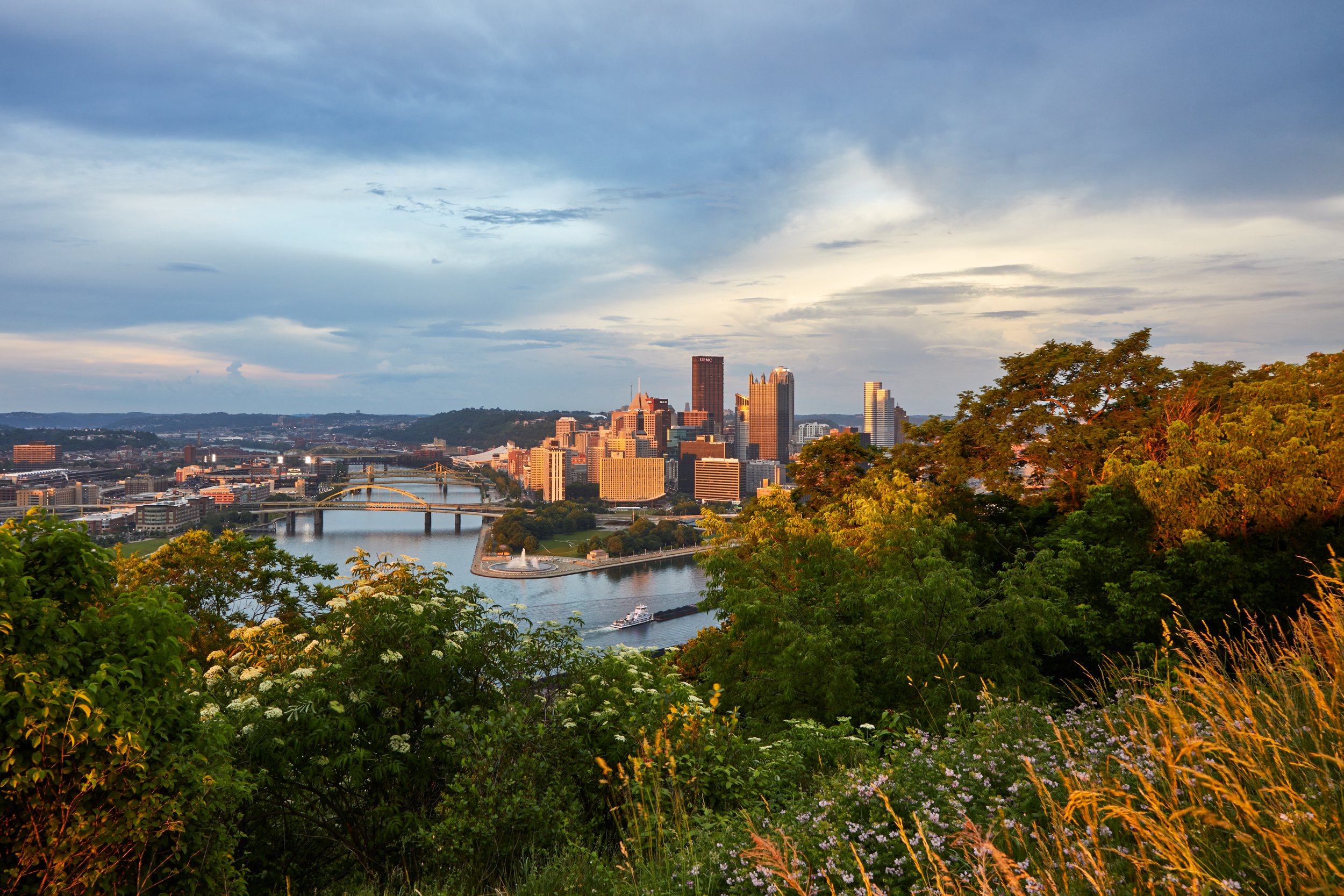
Pittsburgh: After Toker
Before traveling to Pittsburgh, PA, I read Franklin Toker’s acclaimed architectural guide, Pittsburgh: An Urban Portrait. I was quickly drawn in by his knowledge of, and affinity for, the area. Inspired by Toker’s ability to place structures within the historical, cultural, and geographic context of the city, I used his guide to lead me on a photographic pursuit. His book took me through all eras and aspects of the city’s life, from the confluence of the three rivers to the surrounding hills and hollows, from icons of the Golden Triangle to lesser known neighborhood gems.
Additionally, considering that even the latest edition of the book is over a decade old, I took it upon myself to include what I thought were a few worthy new developments for the catalog.
R.I.P. Franklin Toker 1944 - 2021
All quotes by Franklin Toker
Skyline from Mt. Washington

Curtis & Davis
United Steelworkers Building
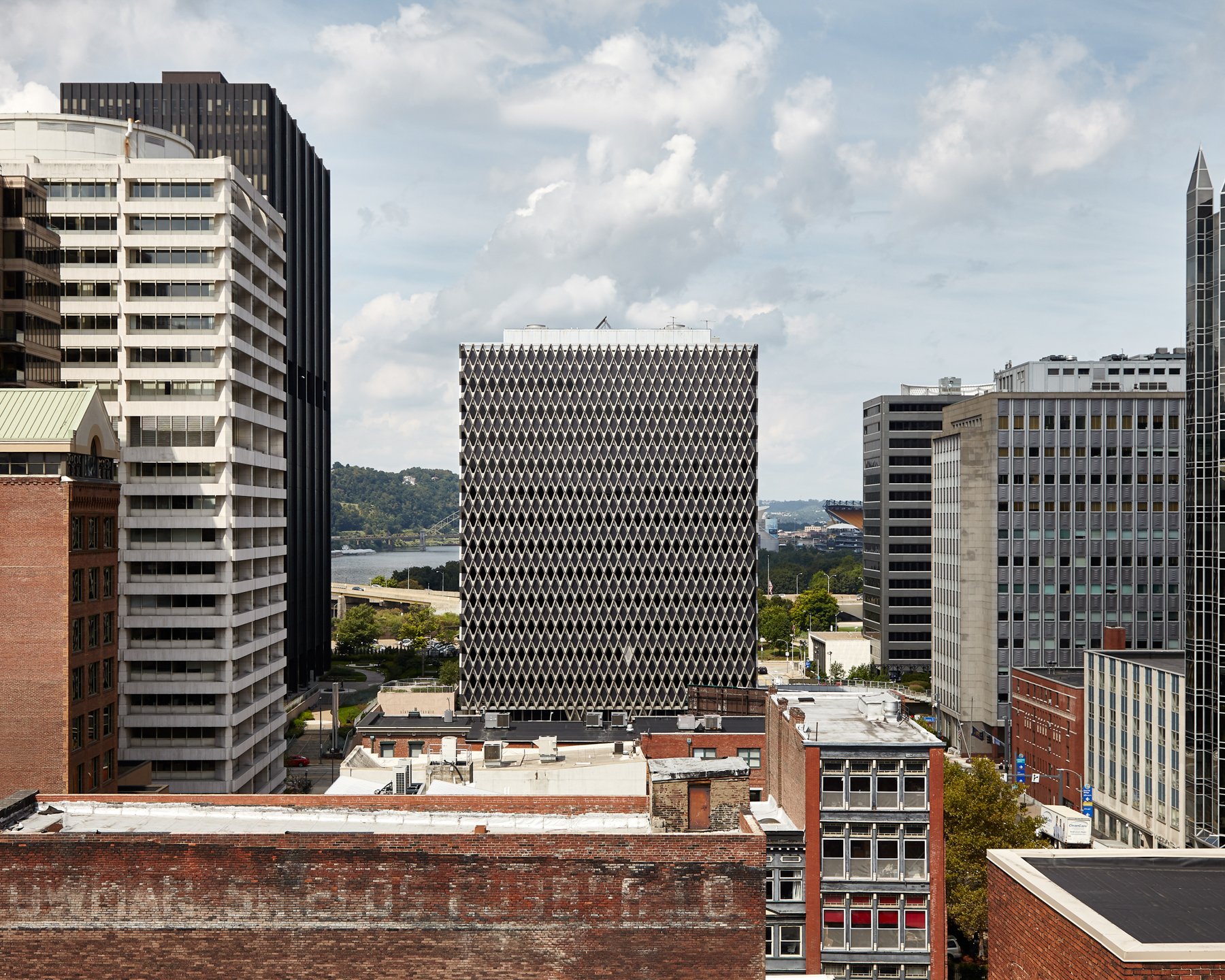
“From its birth in Chicago in the 1880s, the dogma of skyscraper construction was that the exterior walls supported nothing. This dogma held fast for three-quarters of a century until shattered by this Gateway building... U.S. Steel, as supplier and fabricator of the steel, and the design firm of Curtis & Davis of New Orleans knew that they were making structural history here, and they confidently publicized it during construction by painting the three different types of steel in the outside walls red, white, or blue to designate their different structural roles in the bearing wall.”
Curtis & Davis
United Steelworkers Building

Curtis & Davis
United Steelworkers Building
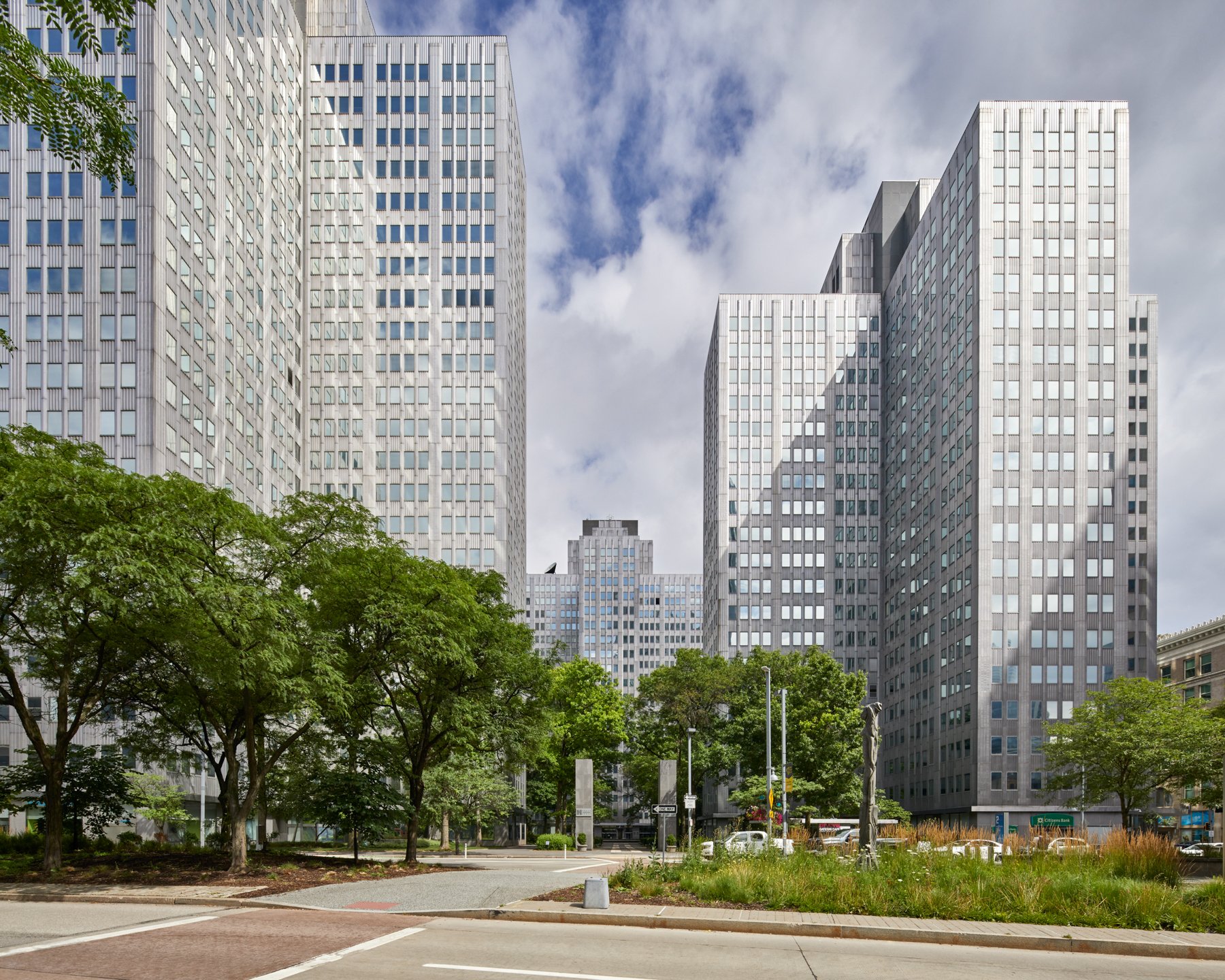
“It was a leap of faith in the future of Pittsburgh, and, in a way no longer imaginable, it was an electrifying demonstration of the healing power of modern architecture.”
Eggers & Higgins
Gateway Center

Eggers & Higgins
Gateway Center

Eggers & Higgins
Gateway Center
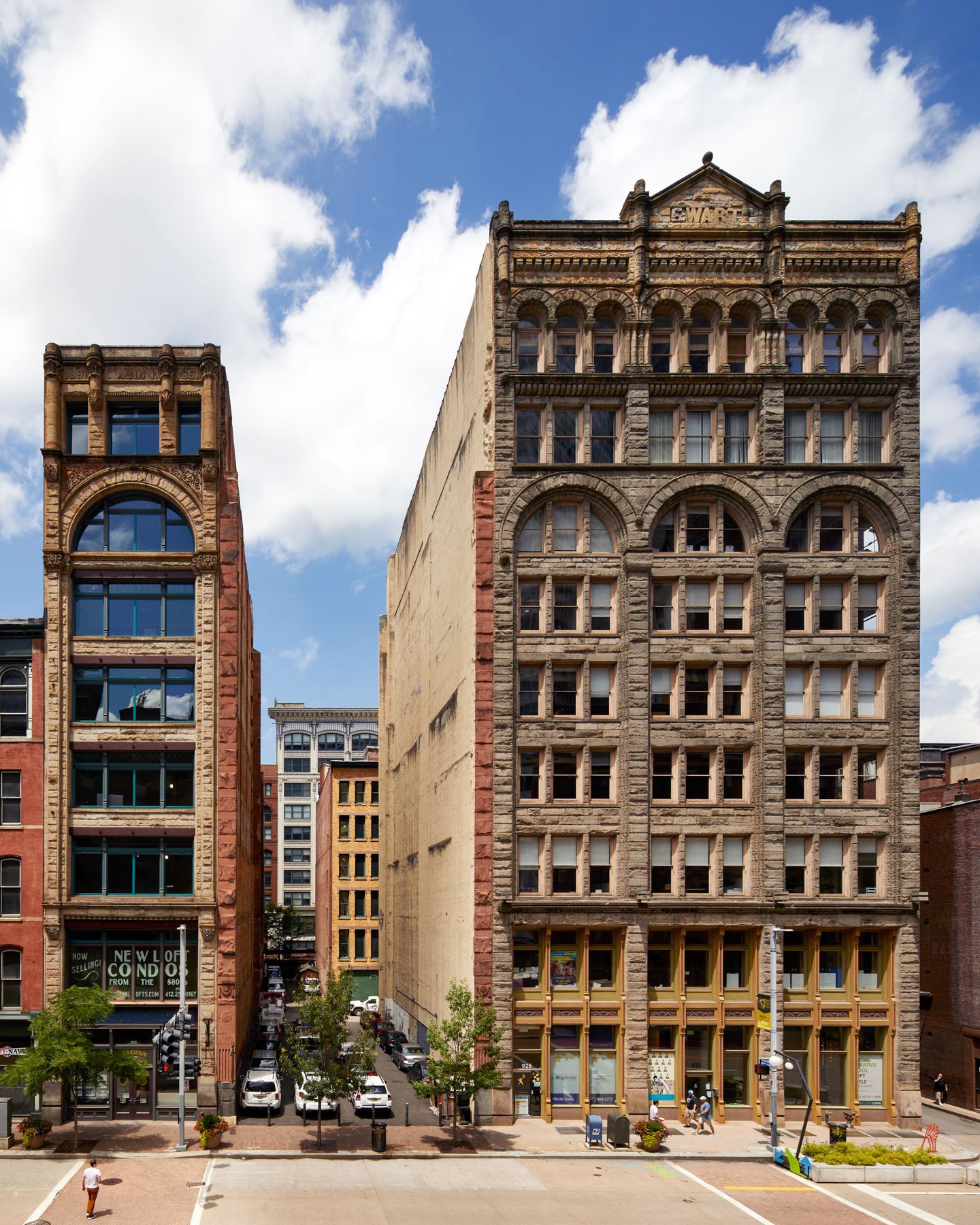
Left
Charles Bickel
Maginn Building
Right
Henry H. Richardson
Ewart Building
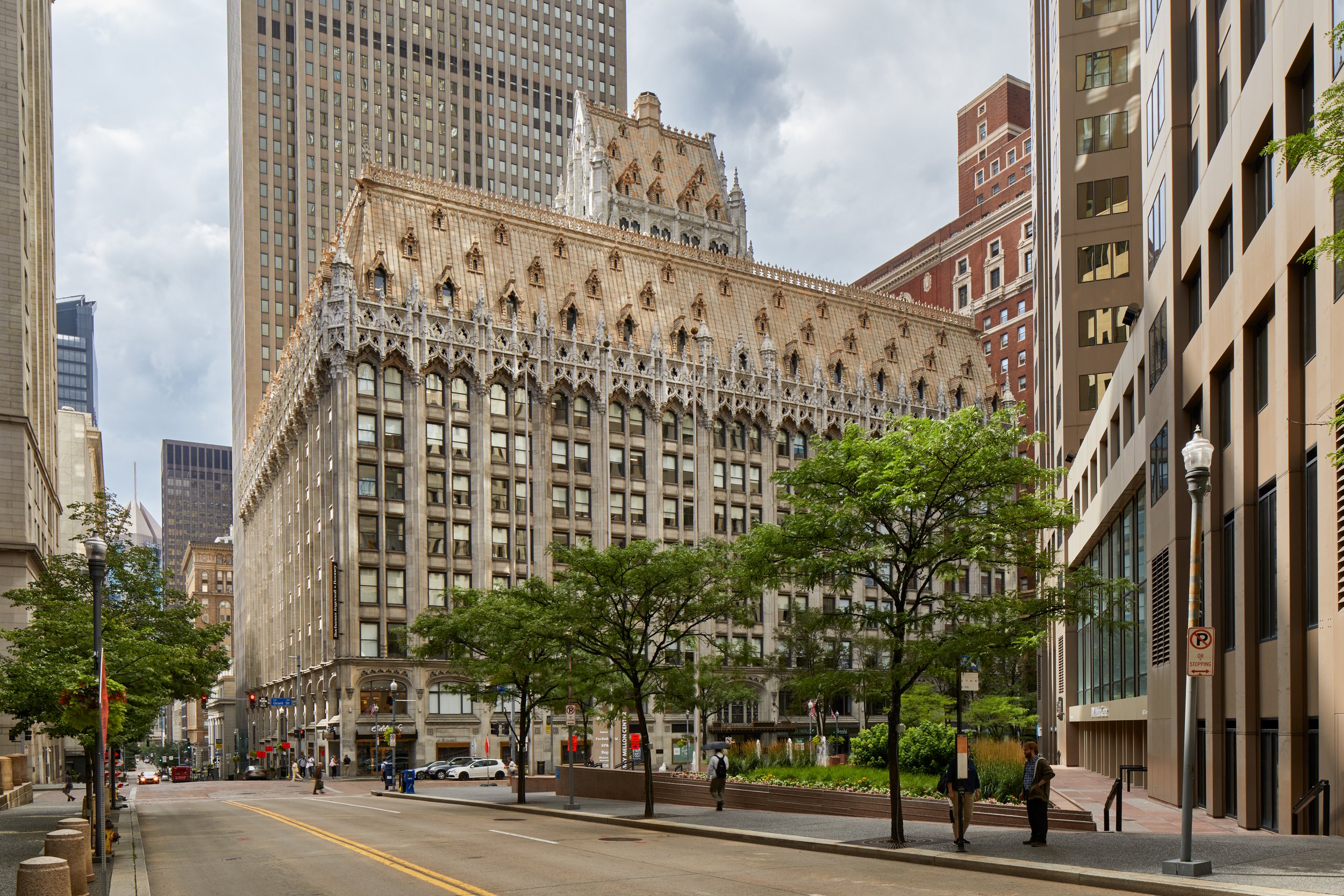
“The Union Trust makes a highly individual statement. It is clad in white terra-cotta plaques and carries an efflorescence of trefoil hoof molds projecting out as a cornice line. The roof line is lively without being busy, and it culminates in a forest of dormers, with two chapel-like elevator shafts poking out at top.”
Frederick J. Osterling
Union Trust Building
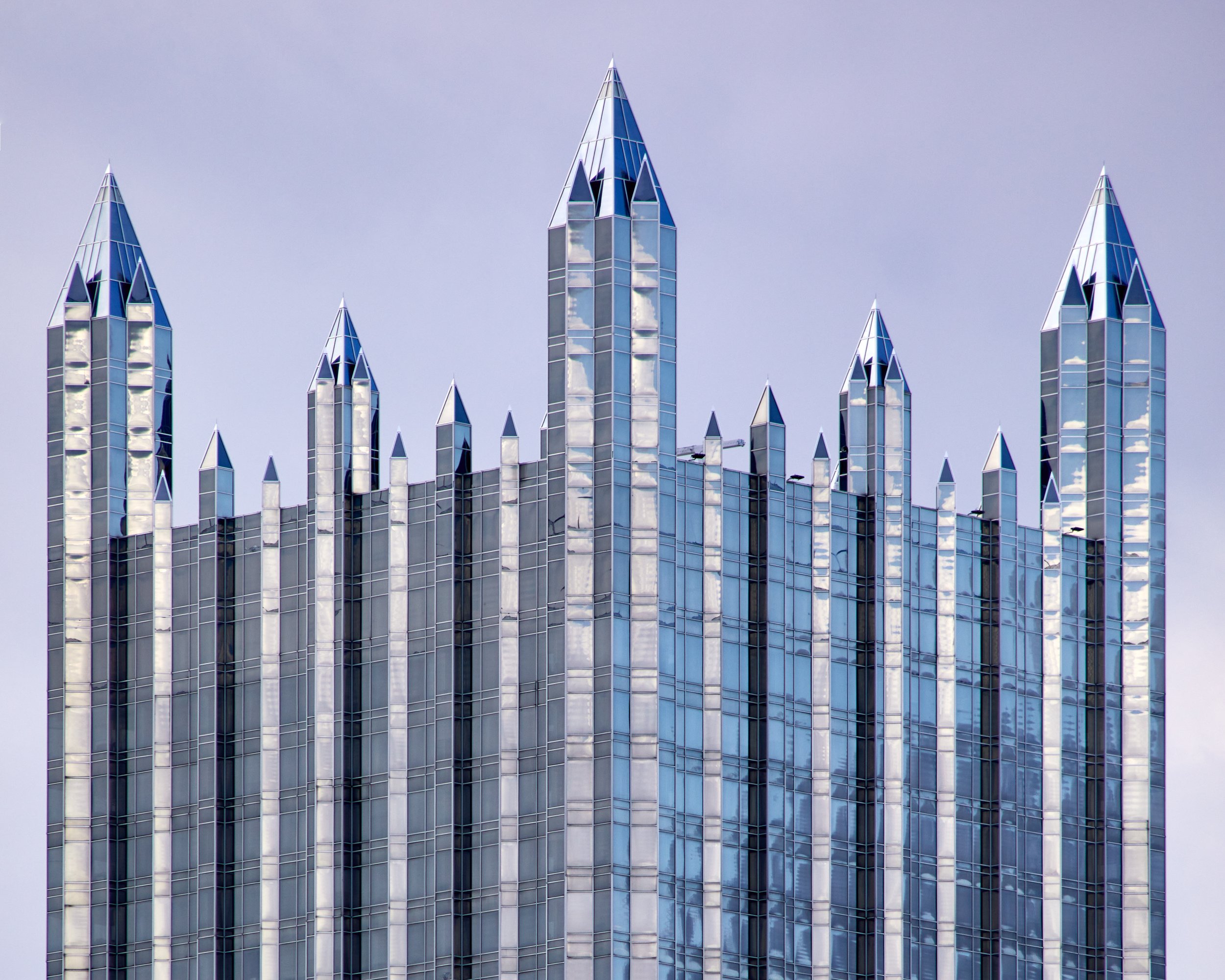
“The obvious precedent of the PPG design is the Victoria Tower at the House of Parliament in London, though it is only about half the height of PPG’s 635 feet.”
Johnson & Burgee
PPG Place
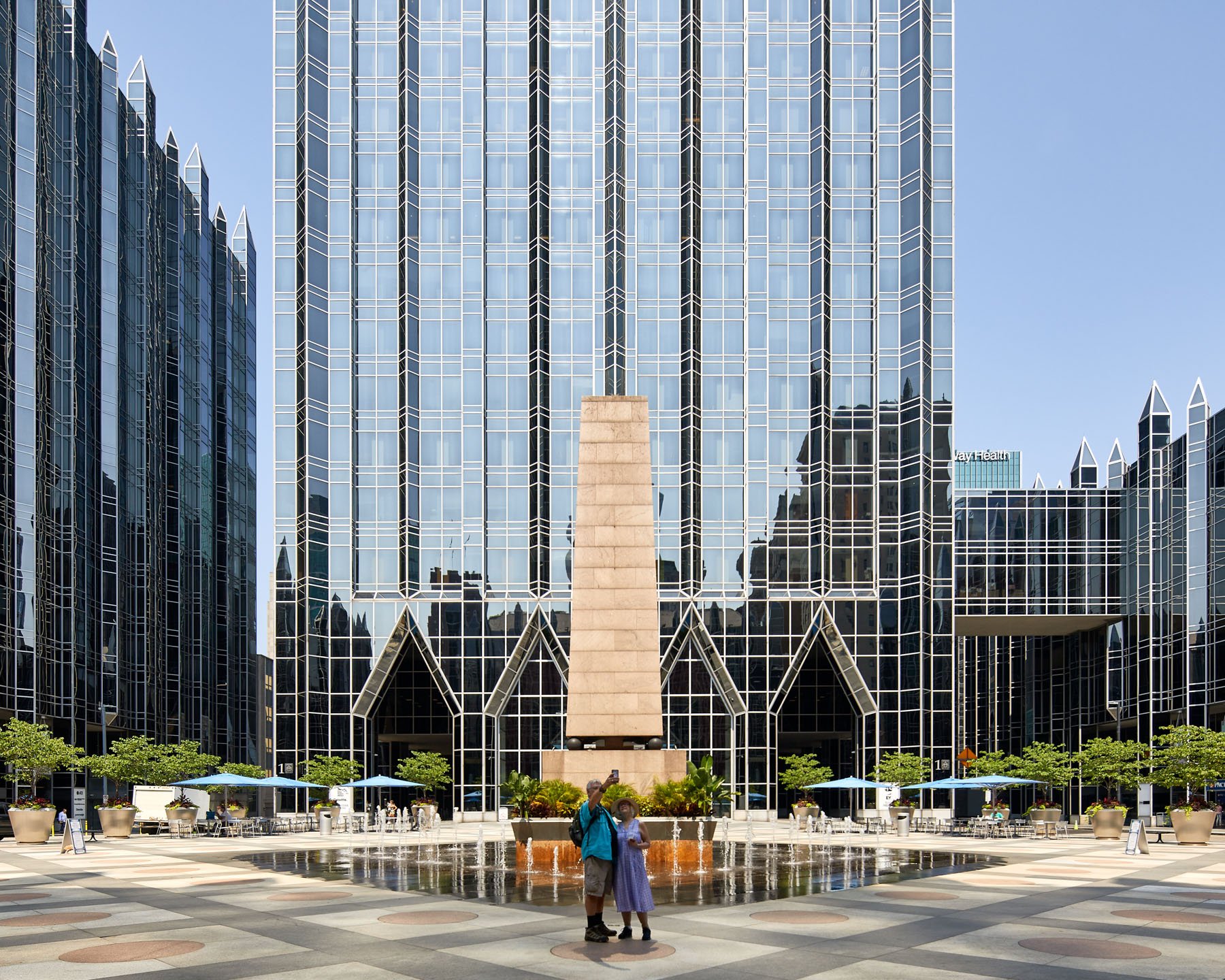
“When the company considered building a headquarters tower near its birthplace on Market Square, it knew that it would be relatively easy to buy only the half acre that it needed. But what PPG really wanted was to upgrade the whole district in the manner of Rockefeller Center, so it purchased an area ten times larger than needed for its own building.”
Johnson & Burgee
PPG Place
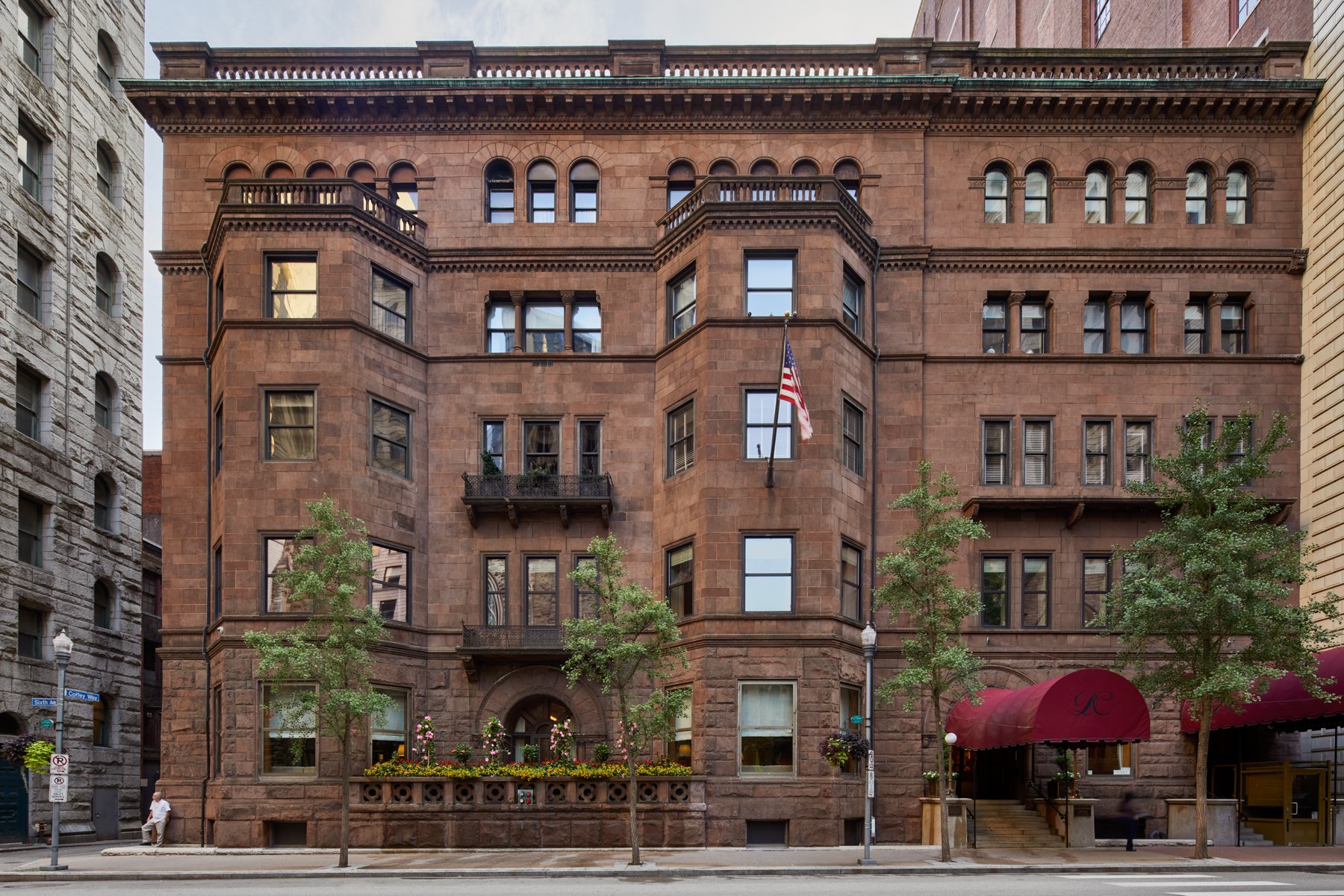
"There is a host of good architectural neighbors to the two congregations on Sixth Avenue. The open-air pulpit in front of First Presbyterian, an unusual medieval feature, points directly across the street at the most powerful of these, the Duquesne Club."
Longfellow, Alden & Harlow
Duquesne Club

Benno Janssen
Buhl Building

Gensler
Tower at PNC Plaza
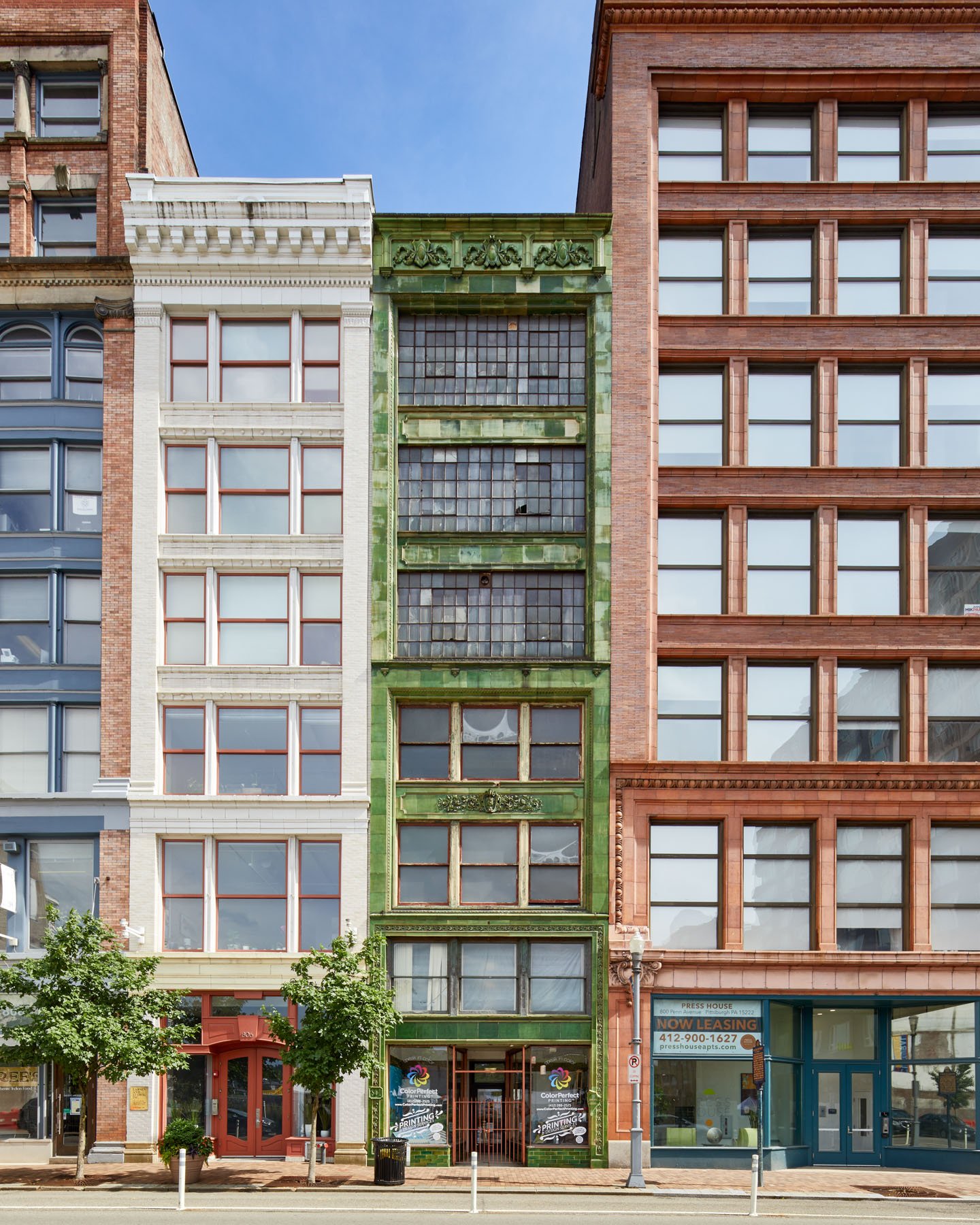
Frederick C. Sauer
804 Penn Ave
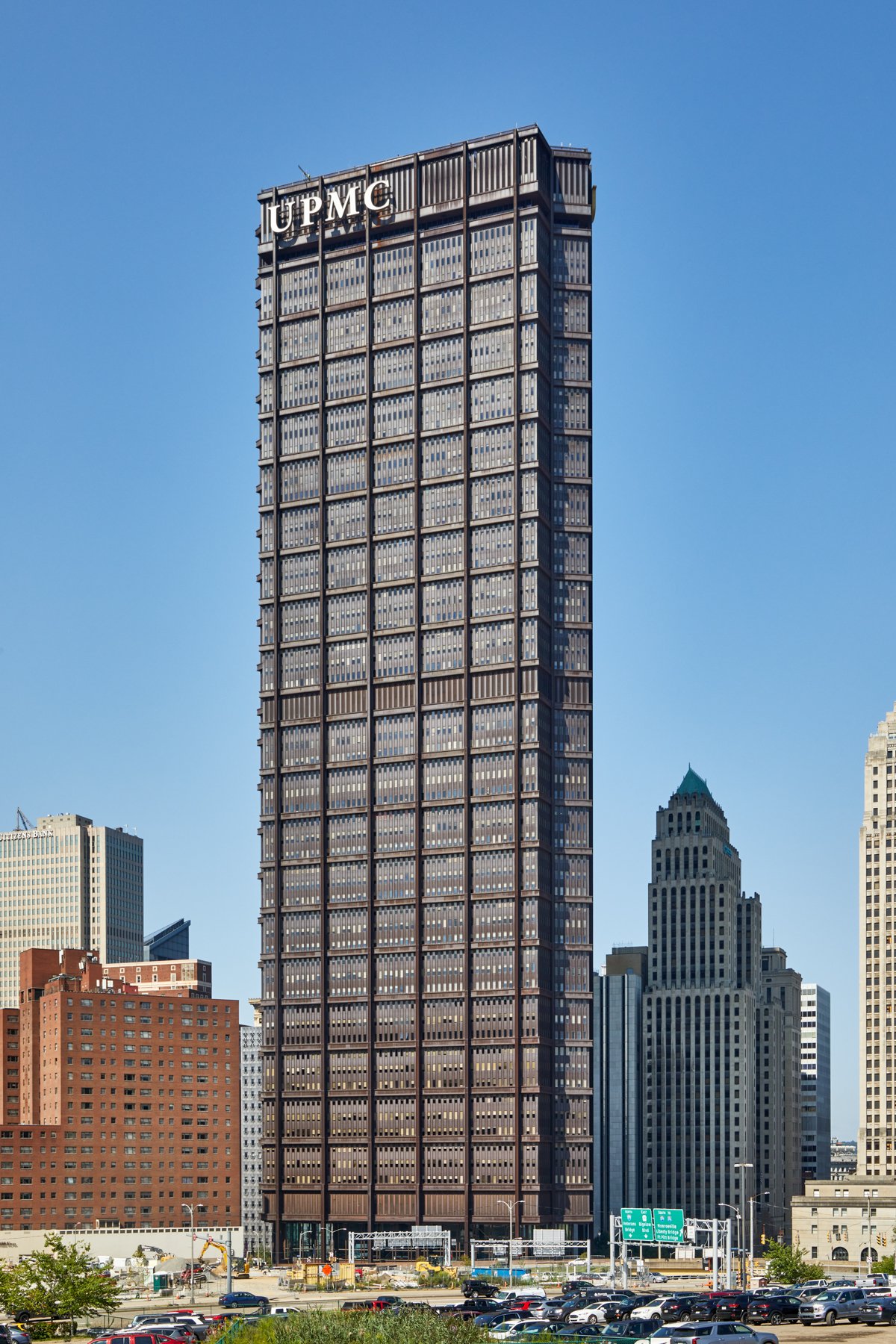
"U.S. Steel is a building that commands respect for its engineering and sensitivity to urban design, bnut it is a hard building to love."
Harrison & Abramovitz
U.S. Steel Tower
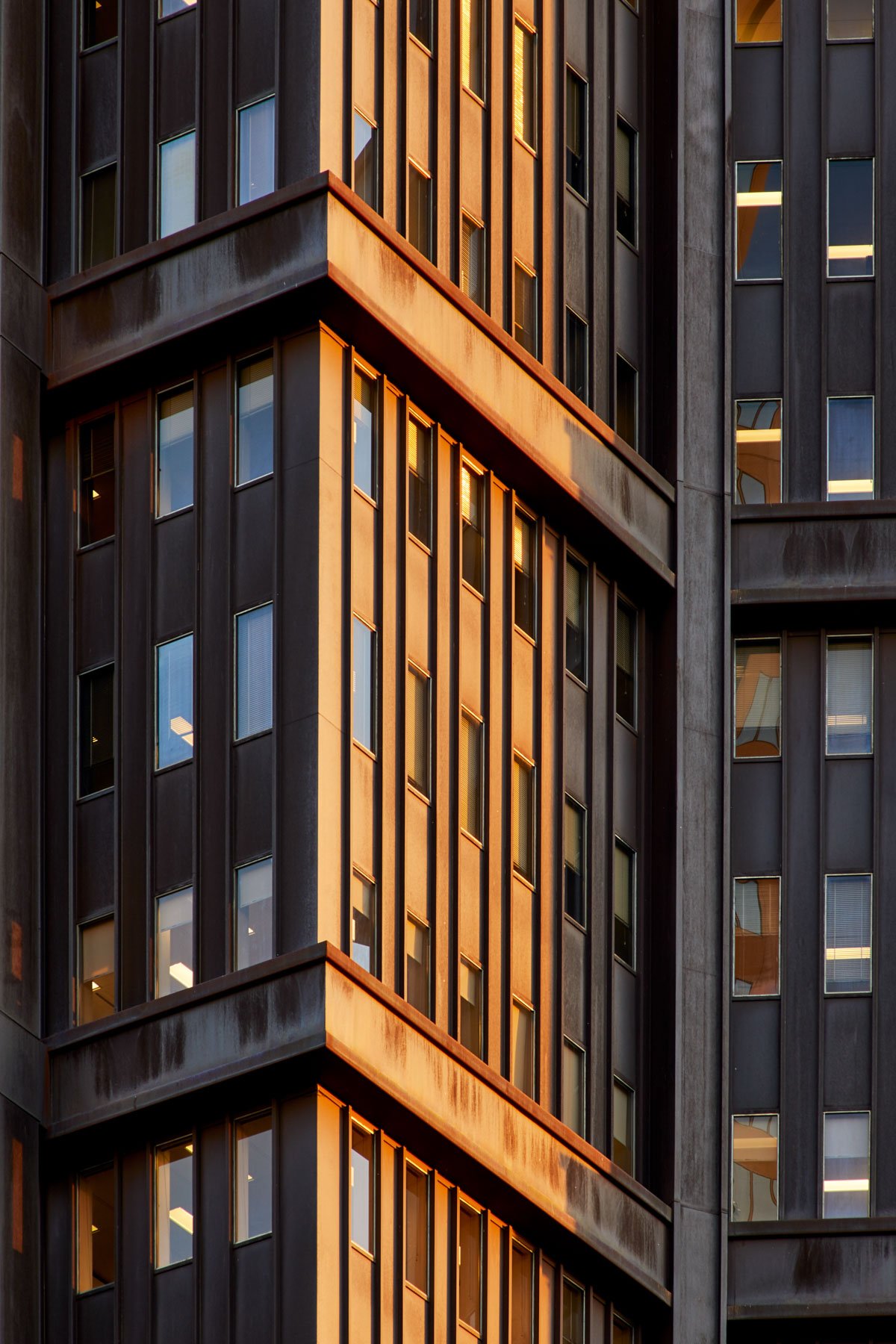
"Cor-Ten, a steel invented in 1934, solved the corrosion problem, because its initial rust forms a protective coating around the steel."
Harrison & Abramovitz
U.S. Steel Tower
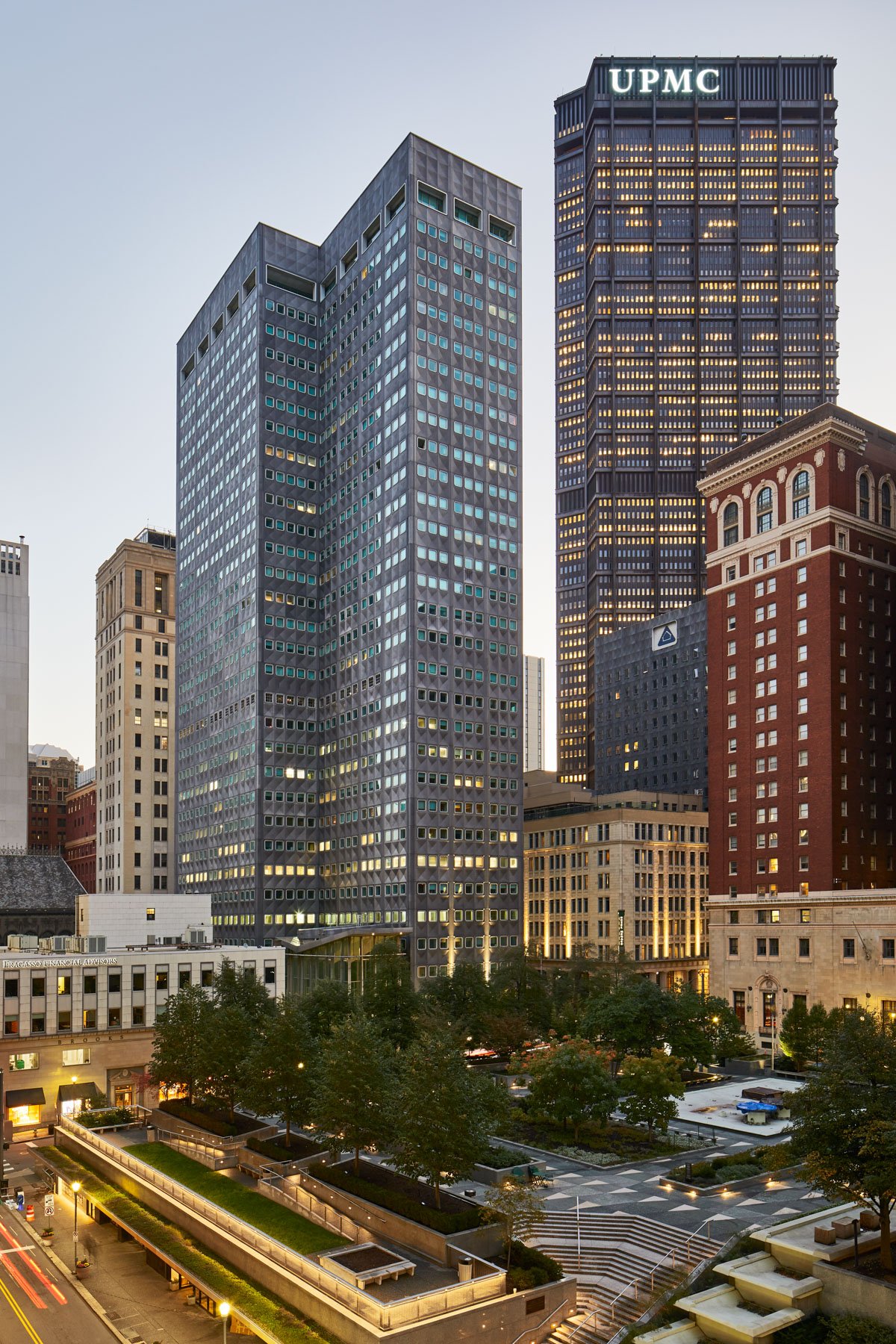
“Using aluminum wherever possible, Alcoa’s thirty story tower is radically lighter and more efficient than buildings of comparable size.”
Harrison & Abramovitz
Alcoa Building
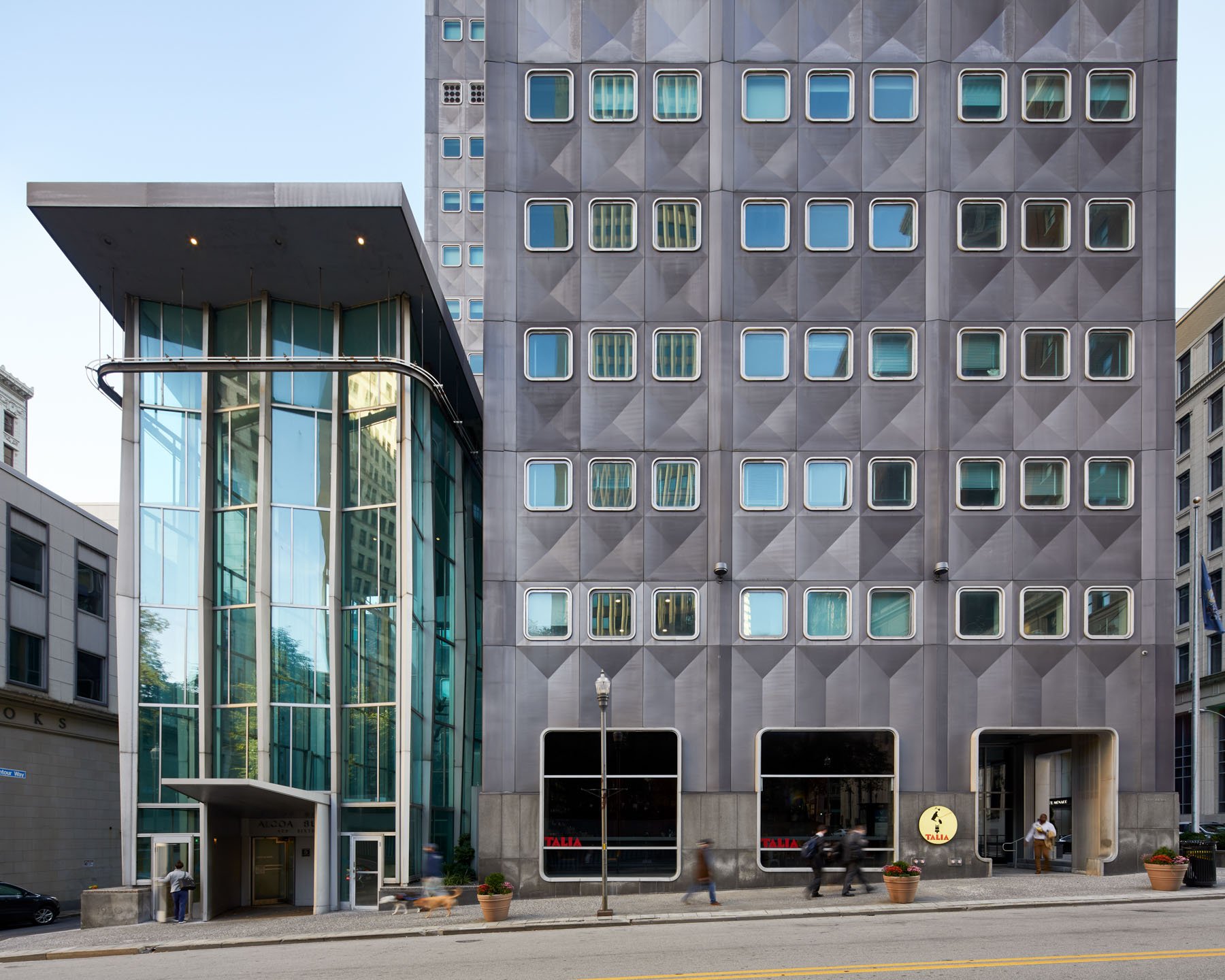
“It’s curtain wall was not constructed piece by piece but prefabricated in aluminum sheets that contained both windows and the floor zone. The windows swing open in special rubber gaskets, so the building's exterior requires minimal cleaning and maintenance. Inside, the same spirit of radical innovation prevailed: aluminum furniture, aluminum piping and wiring, aluminum air-conditioning ducts, and an airy fanciful lobby. This list of distinctions briefly propelled Alcoa to top rank among post-war skyscrapers, but it was evidently too futuristic for the national design community, which shunned it for thirty years.”
Harrison & Abramovitz
Alcoa Building
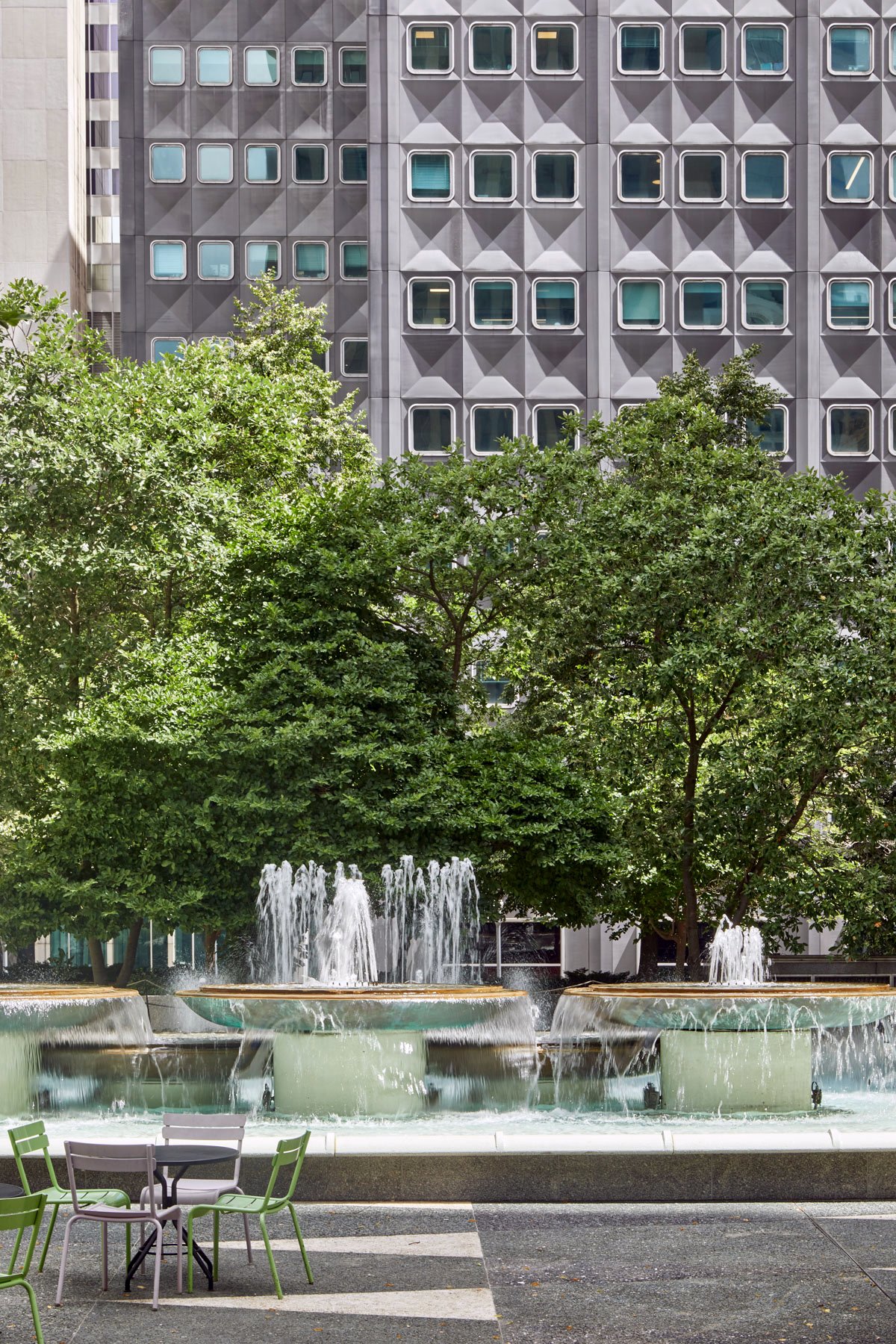
Mitchell & Ritchey
Mellon Square

Private Residence
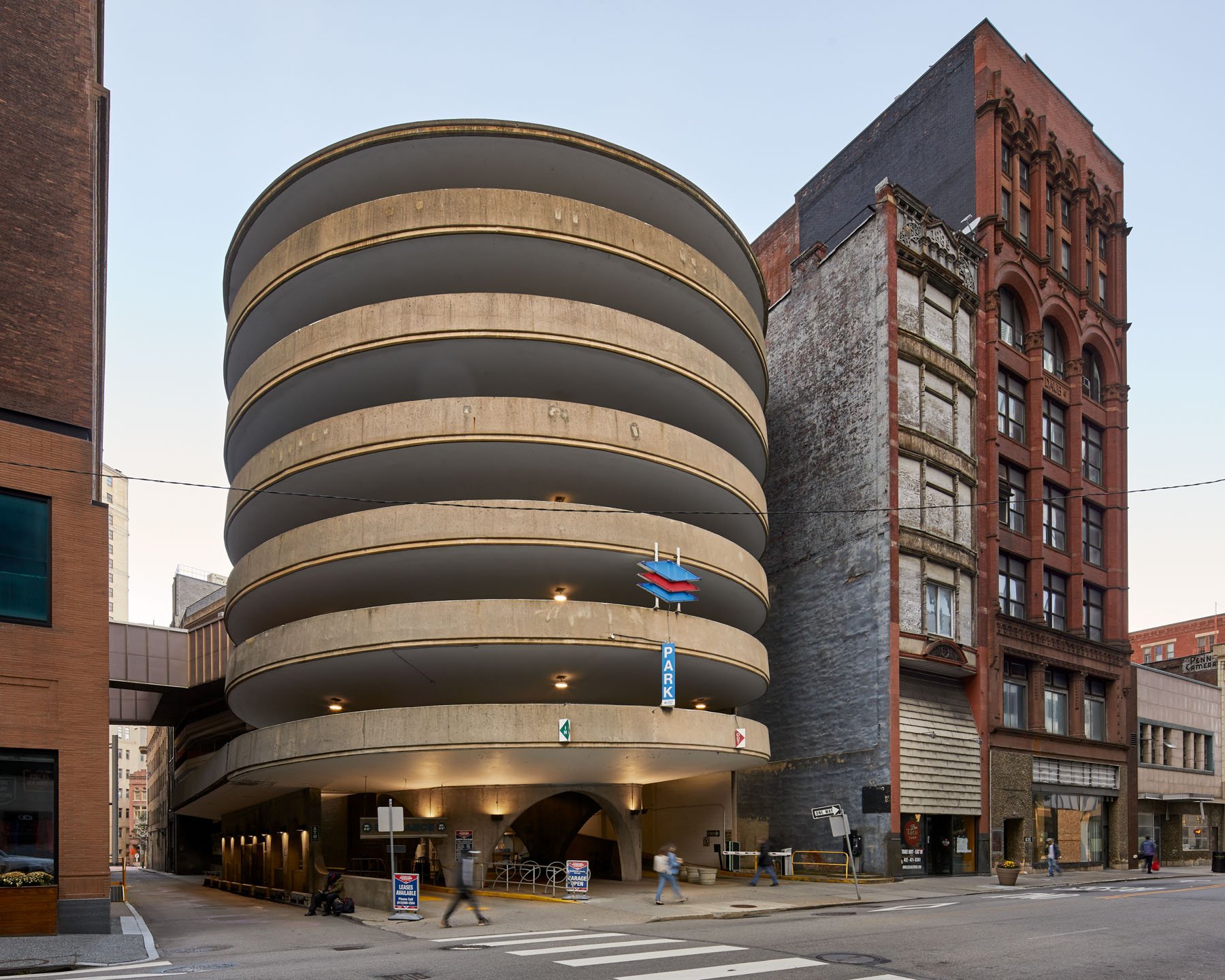
Smithfield-Liberty Garage
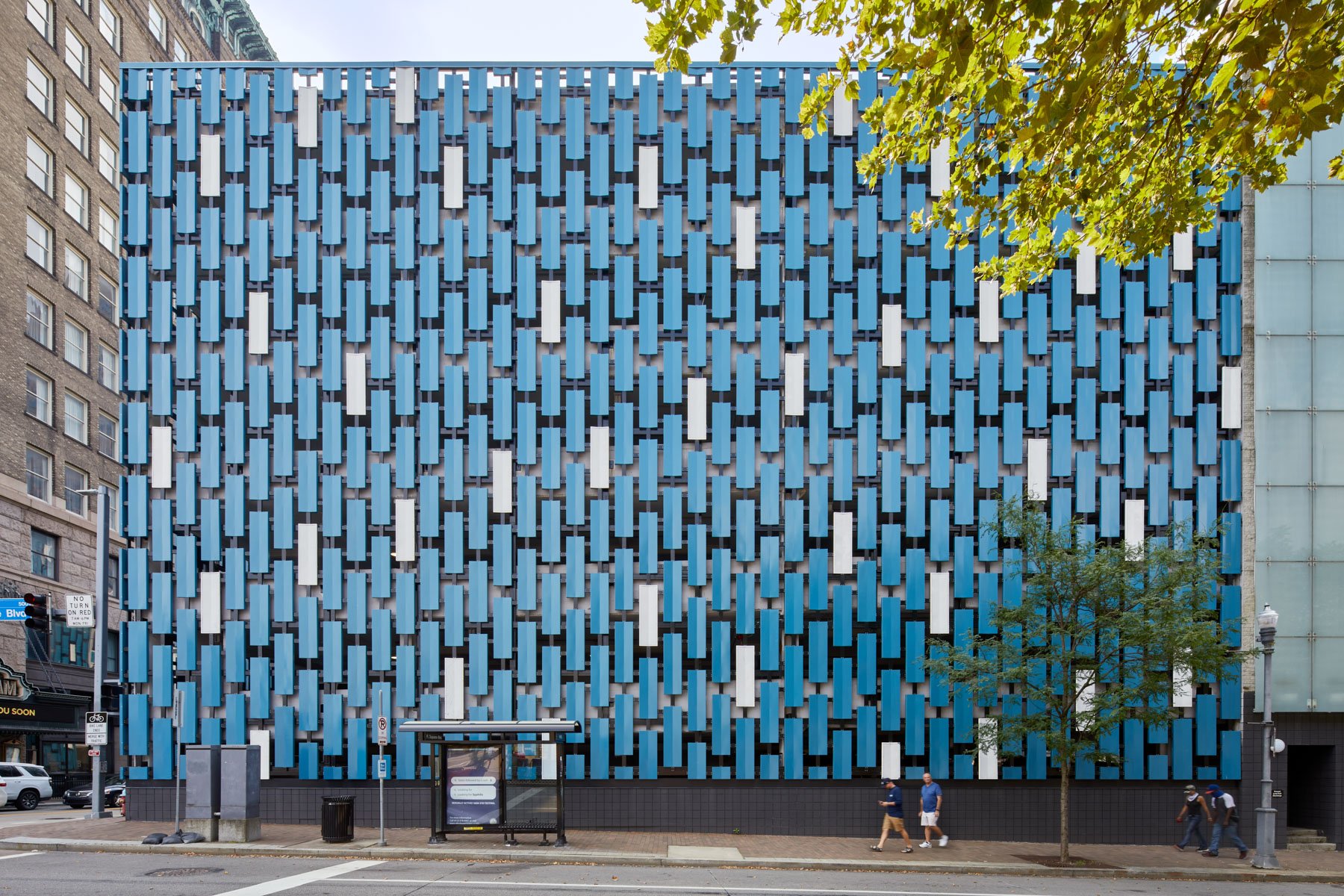
Ft. Duquesne and 6th St. Garage
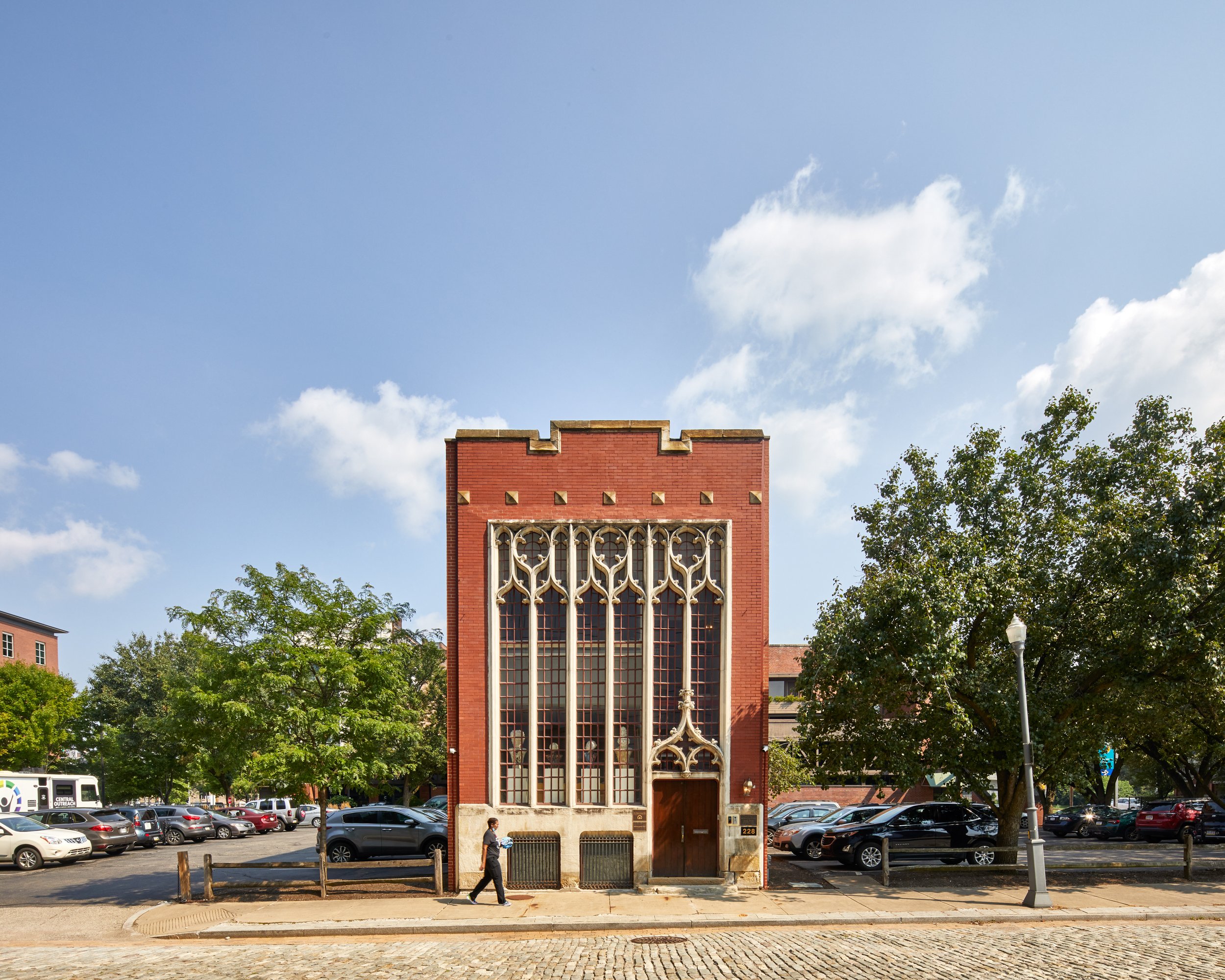
“…this diminutive building from 1917 presents a glass facade of Gothic trefoils in the manner of Osterling’s Union Trust Building, Downtown. When it was Osterlings Studio it provided an elegant reception room above a large drafting hall below. Osterlings studio ranks among America’s earliest glass fronted buildings, and it speaks volumes about architects’ social and economic position in Pittsburgh society early in the twentieth century.”
Frederick J. Osterling
Frederick J. Osterling Studio
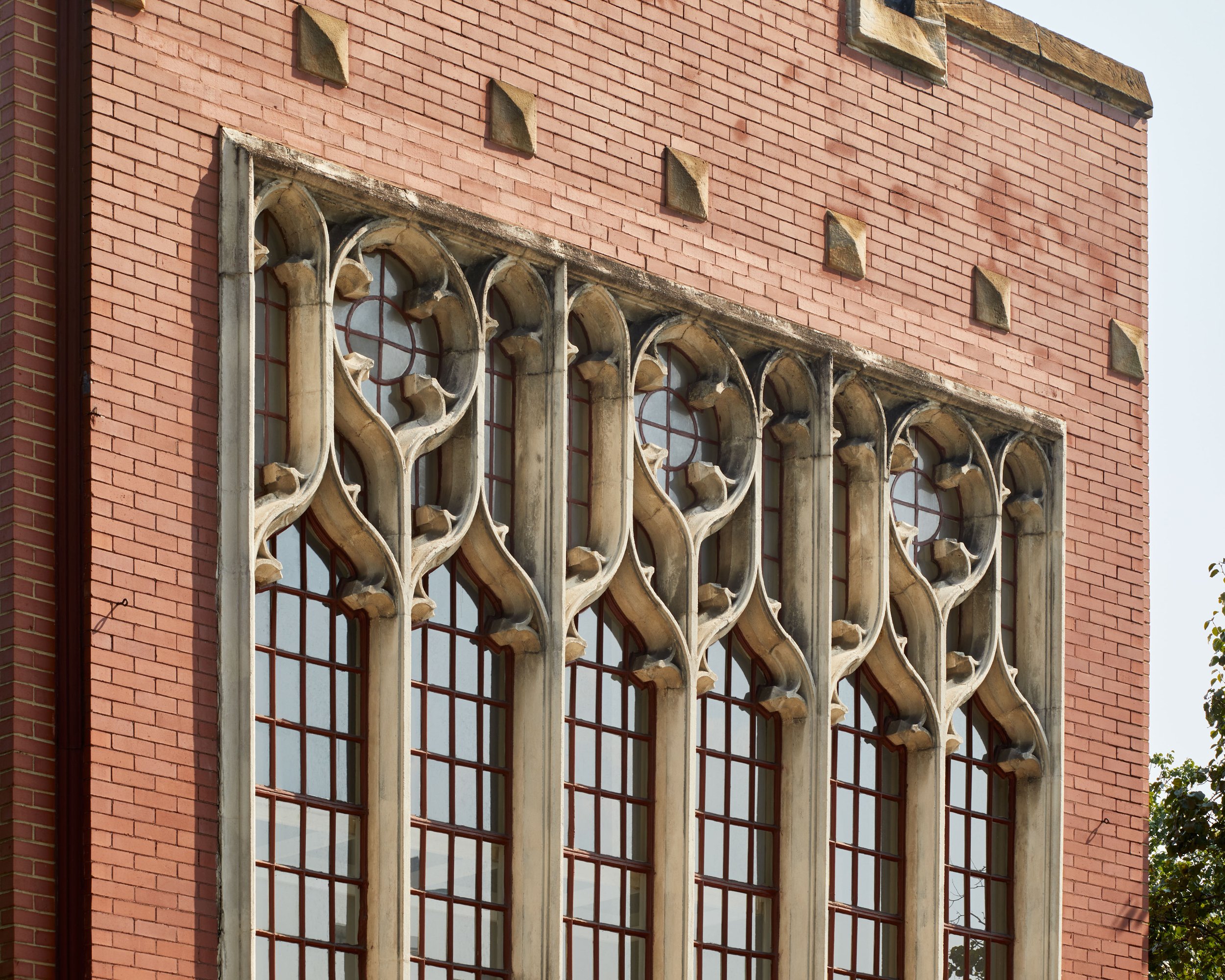
Frederick J. Osterling
Frederick J. Osterling Studio
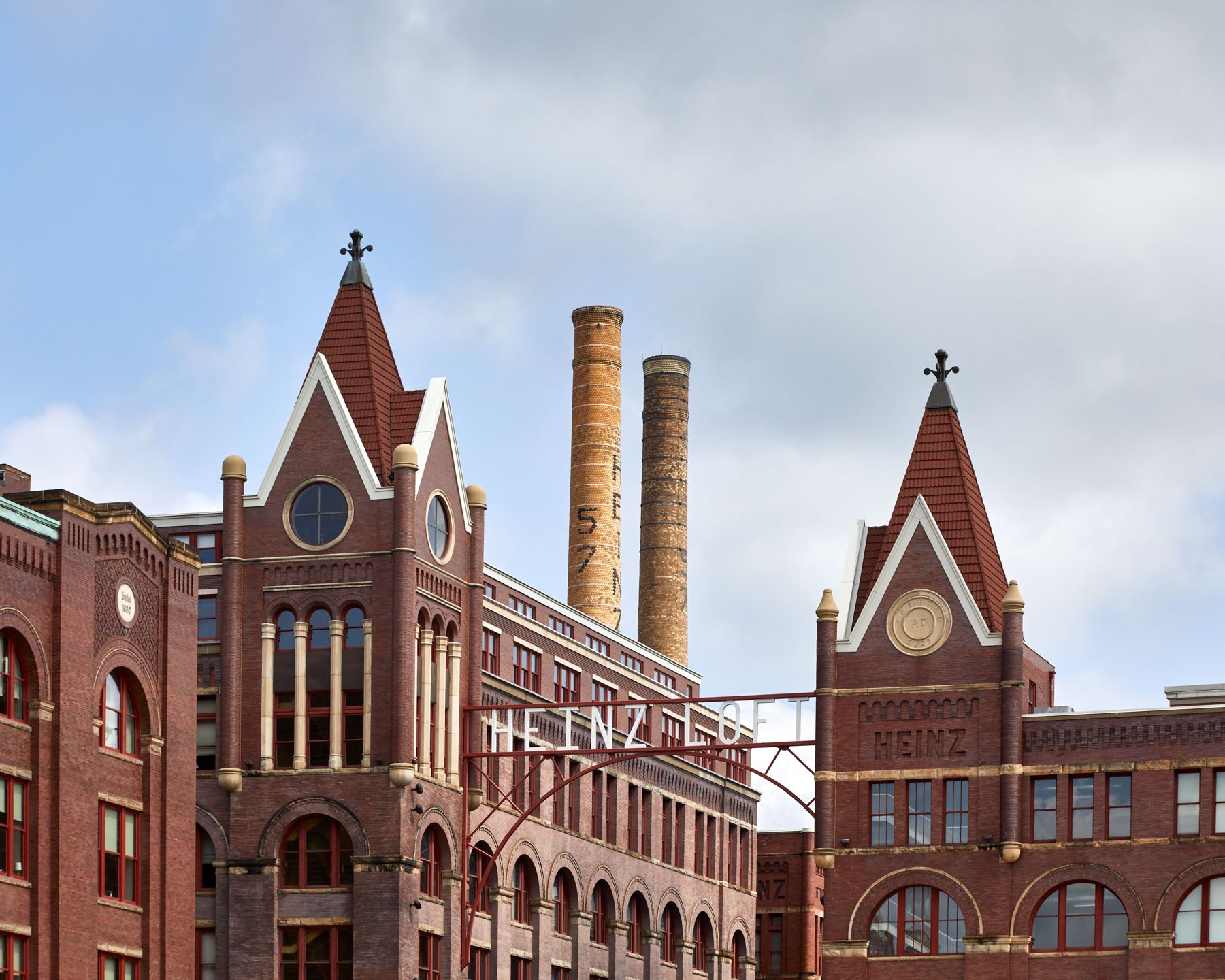
Heinz Factory Complex
Meat & Cereal Buildings & Stacks
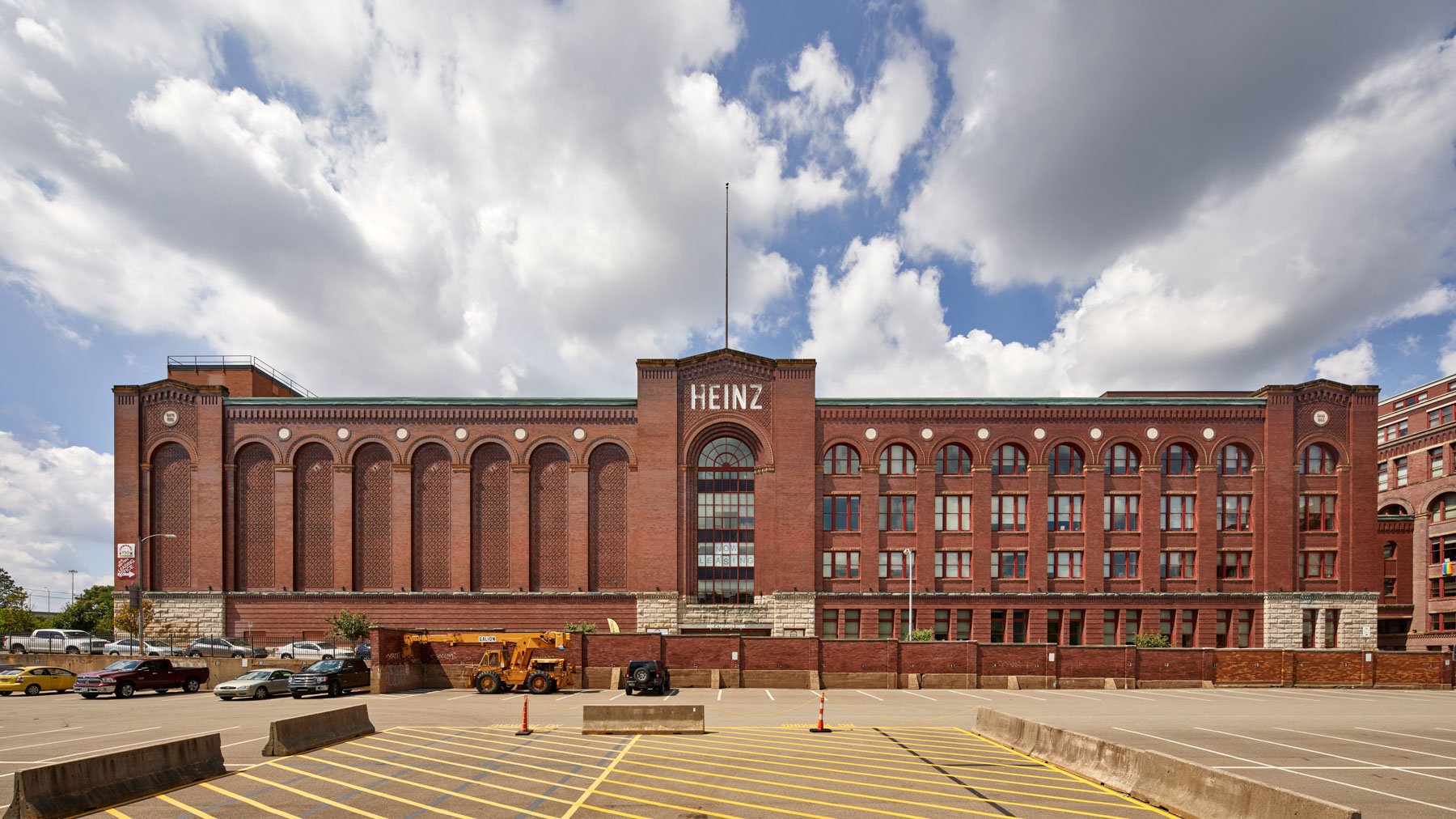
Albert Kahn
Heinz Factory Complex
Service & Auditorium Building
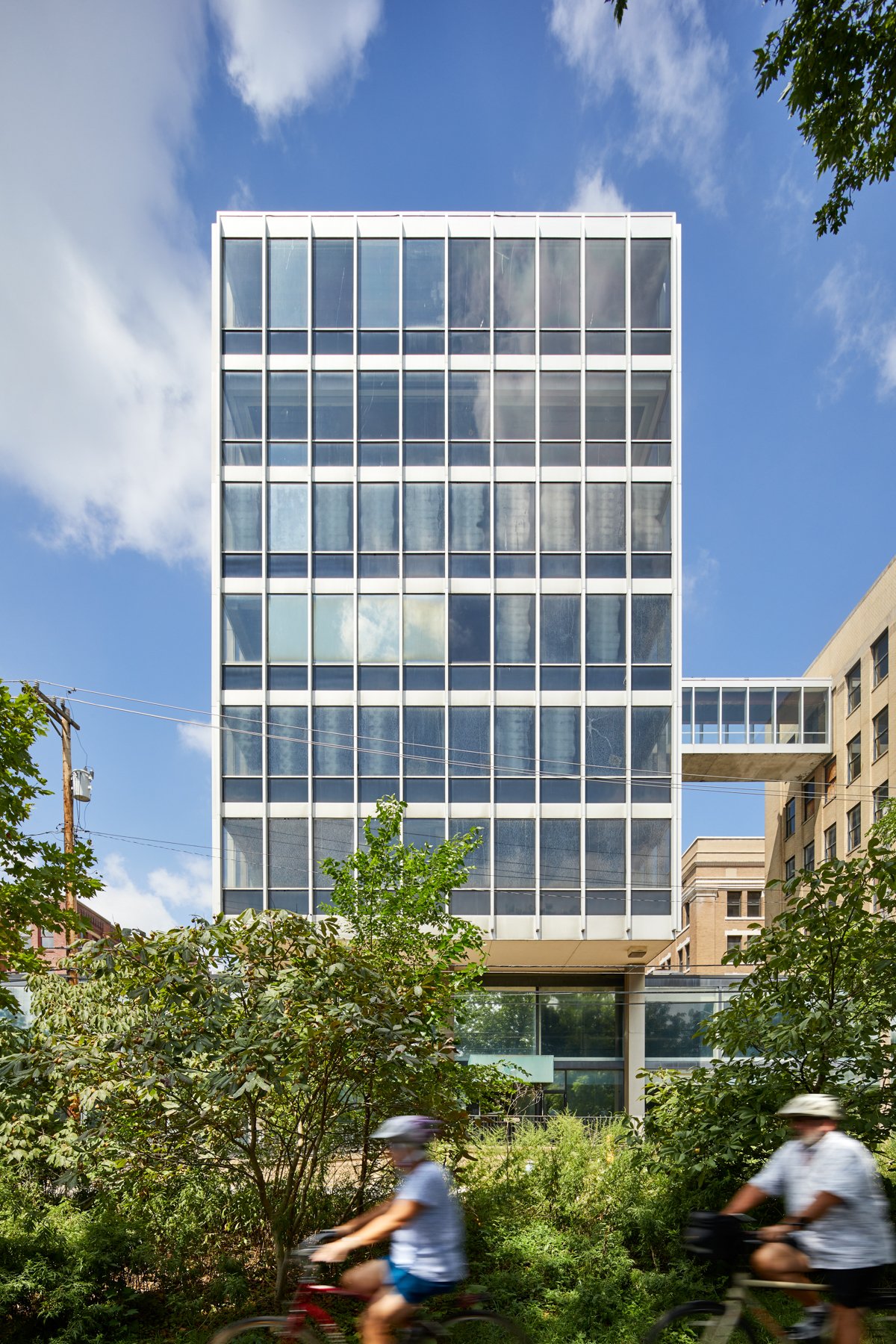
SOM
Heinz Factory Complex
Research Building

SOM
Heinz Factory Complex
Research Building
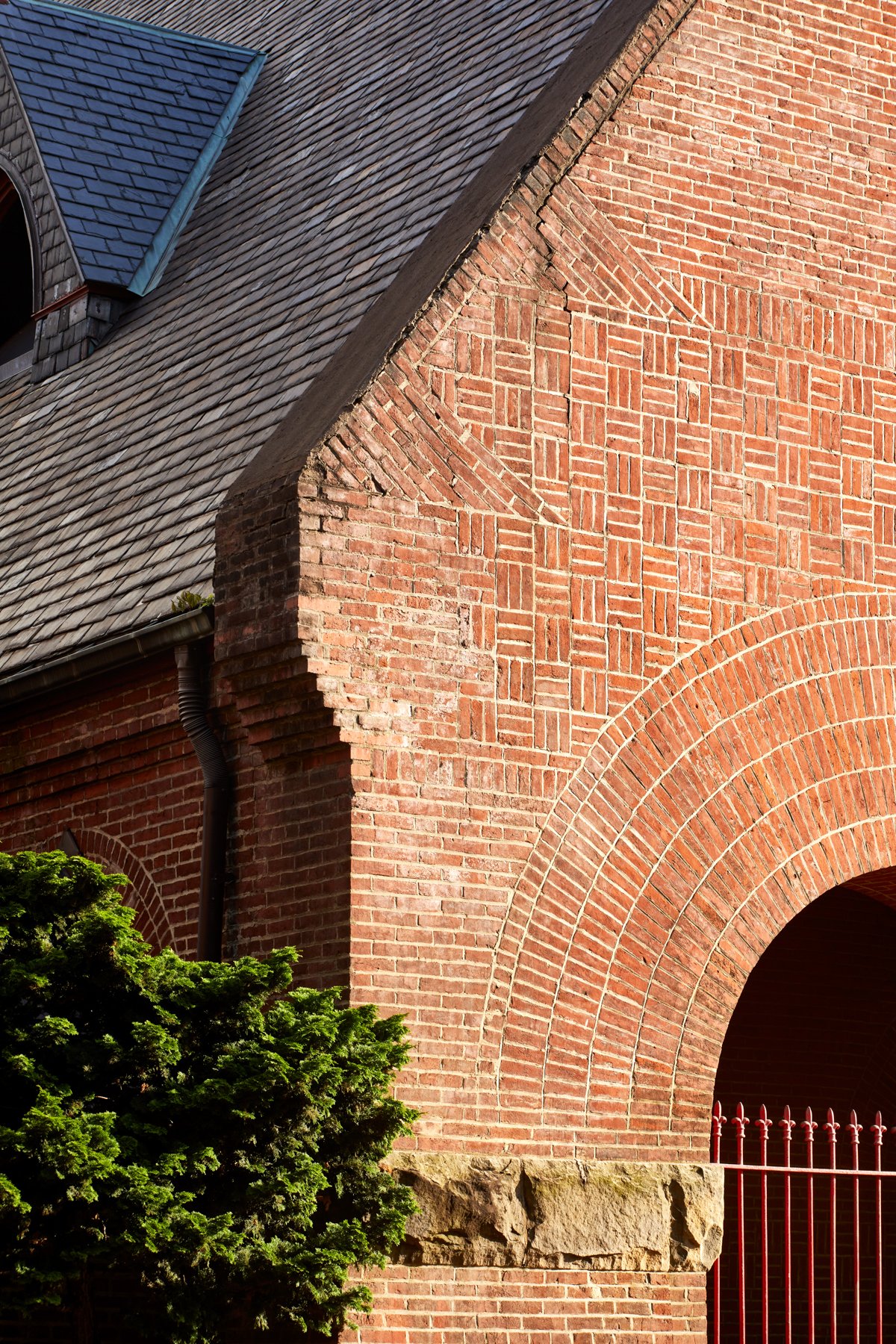
“The brickwork designs are richer than any Richardson had designed before, which shows his trust in the skilled Pittsburgh laborers who executed them.”
Henry H. Richardson
Emmanuel Episcopal Church

Henry H. Richardson
Emmanuel Episcopal Church
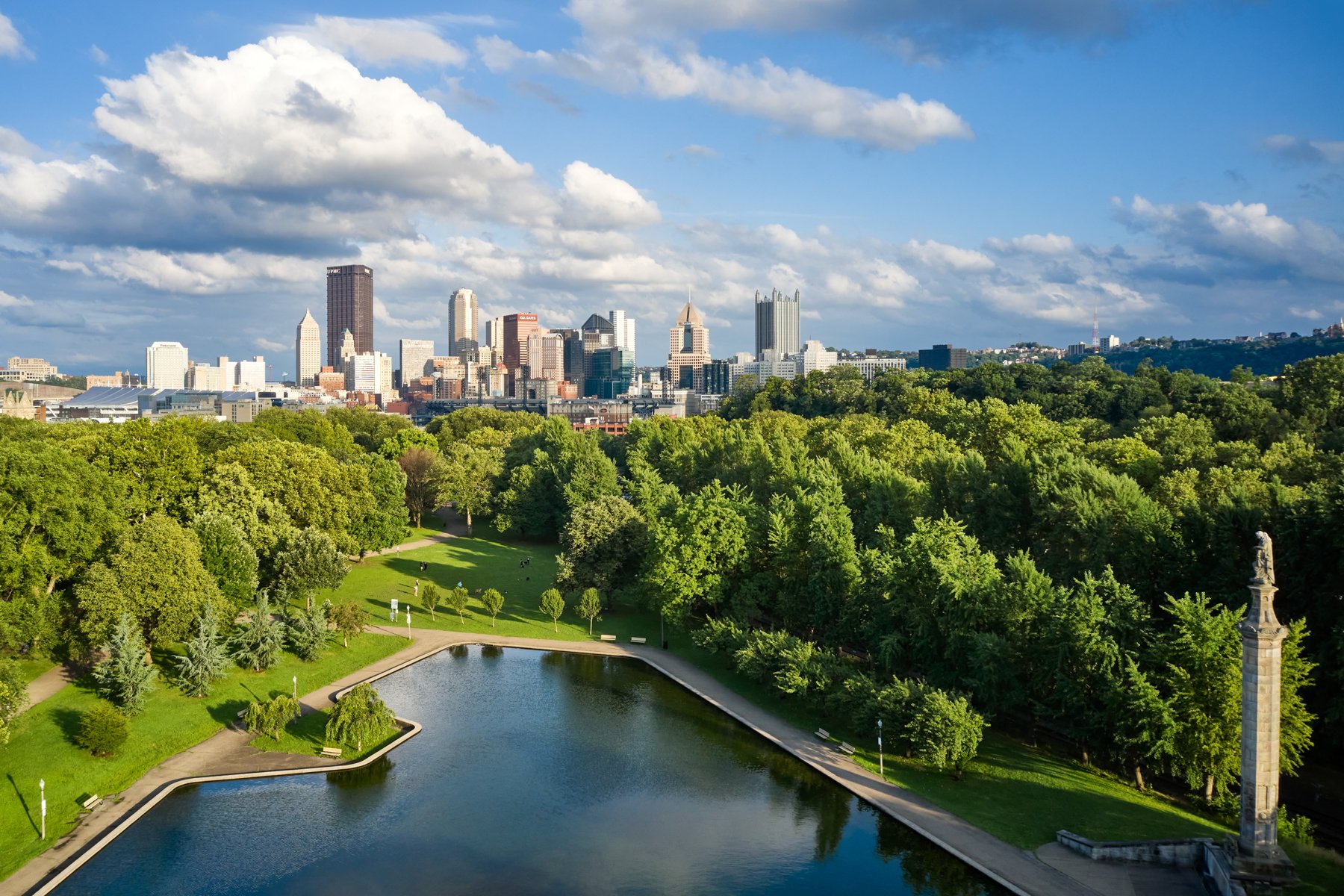
Skyline from the North Side
Allegheny Commons

Lake Elizabeth from above
Allegheny Commons
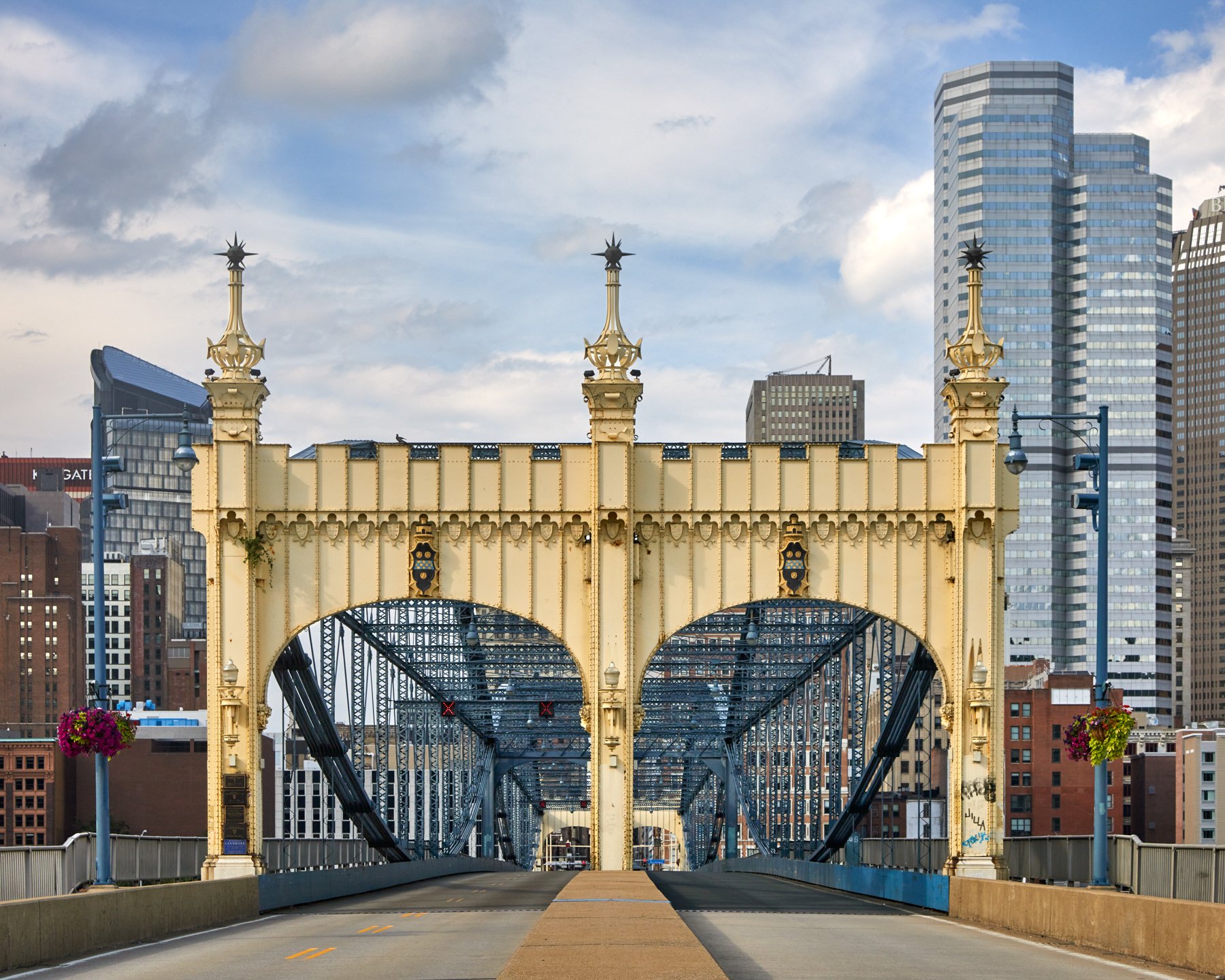
Gustav Lindenthal
Smithfield Street Bridge

Gustav Lindenthal
Smithfield Street Bridge
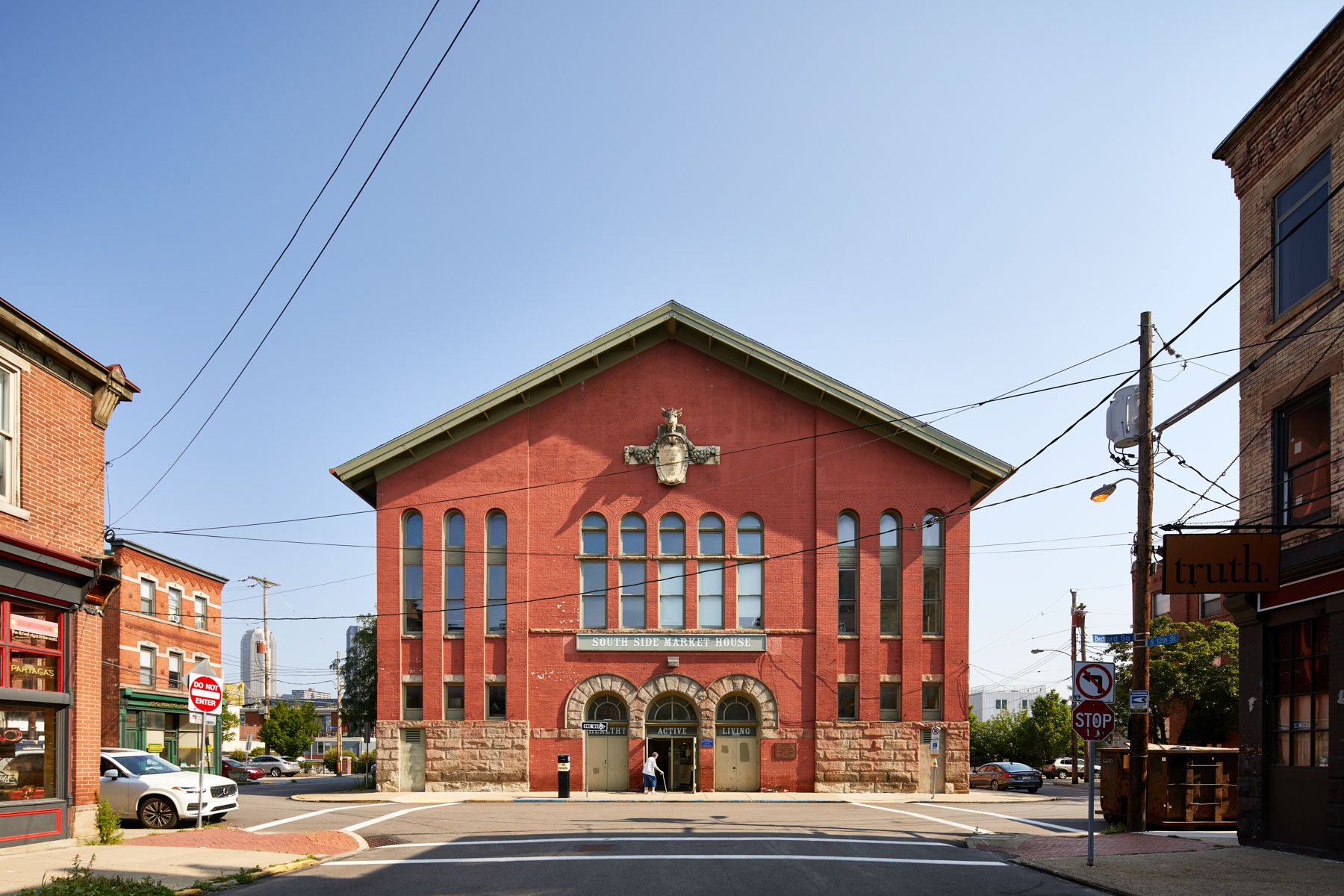
Charles Bickel
South Side Market Building
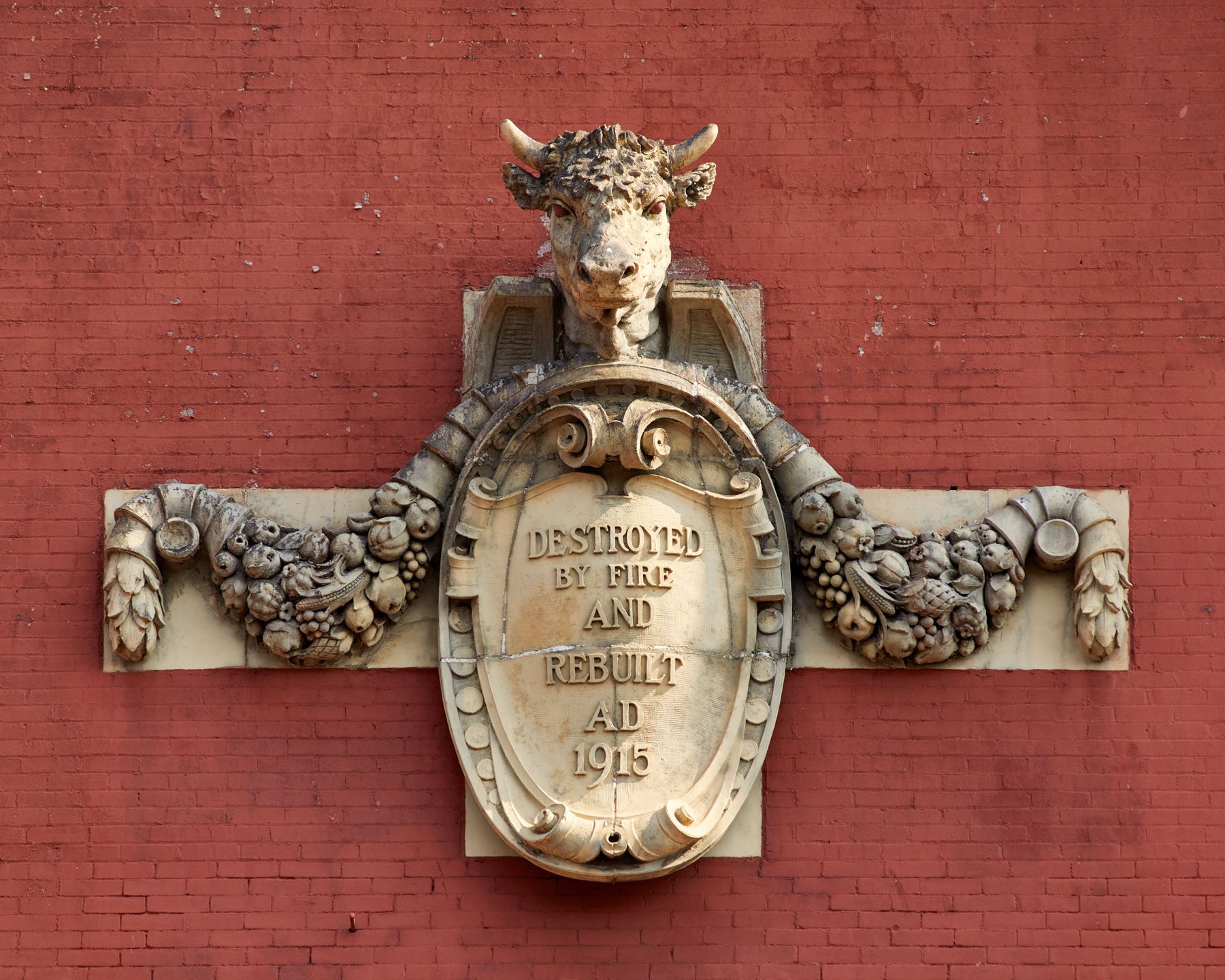
Charles Bickel
South Side Market Building
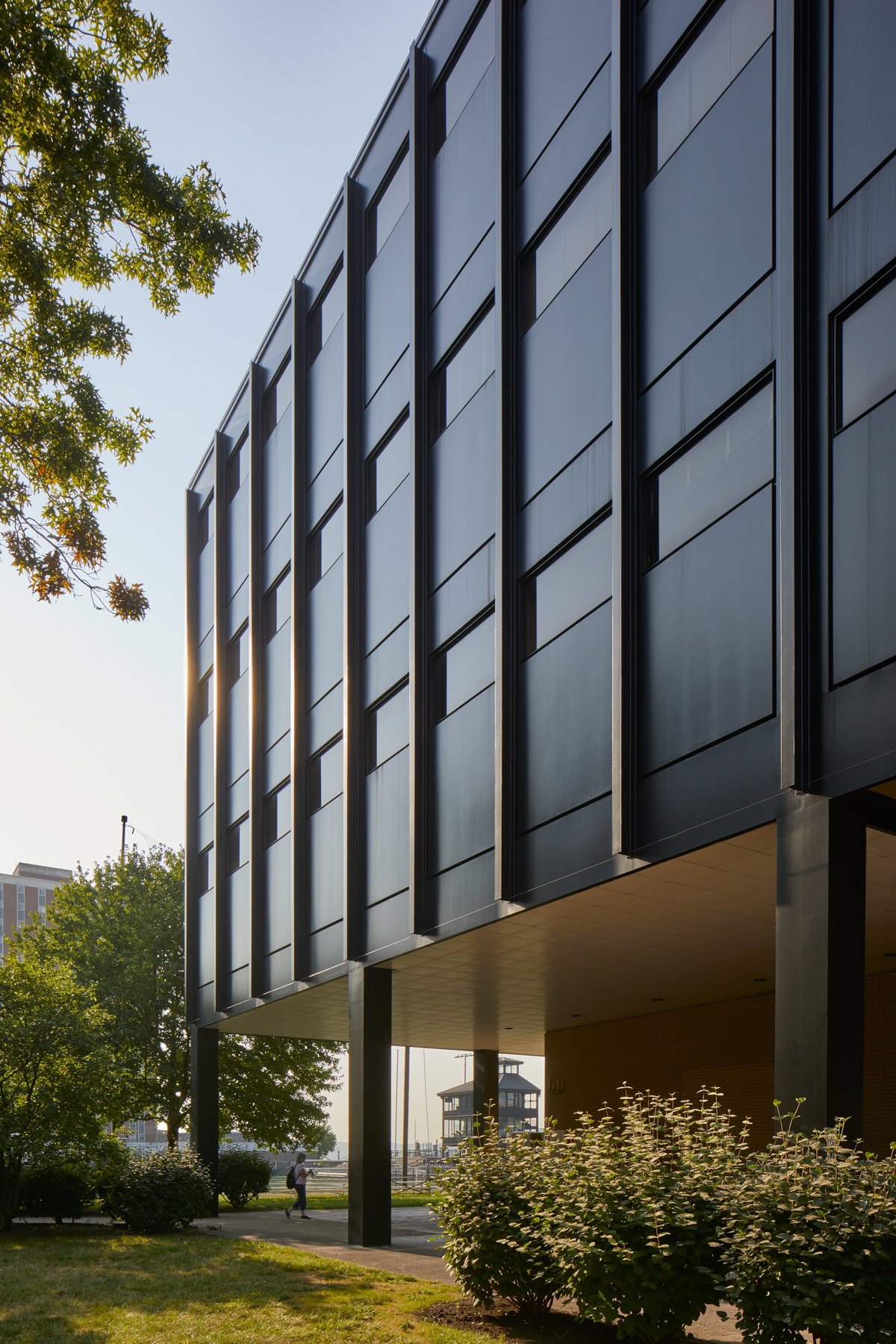
Mies van der Rohe
Mellon Hall
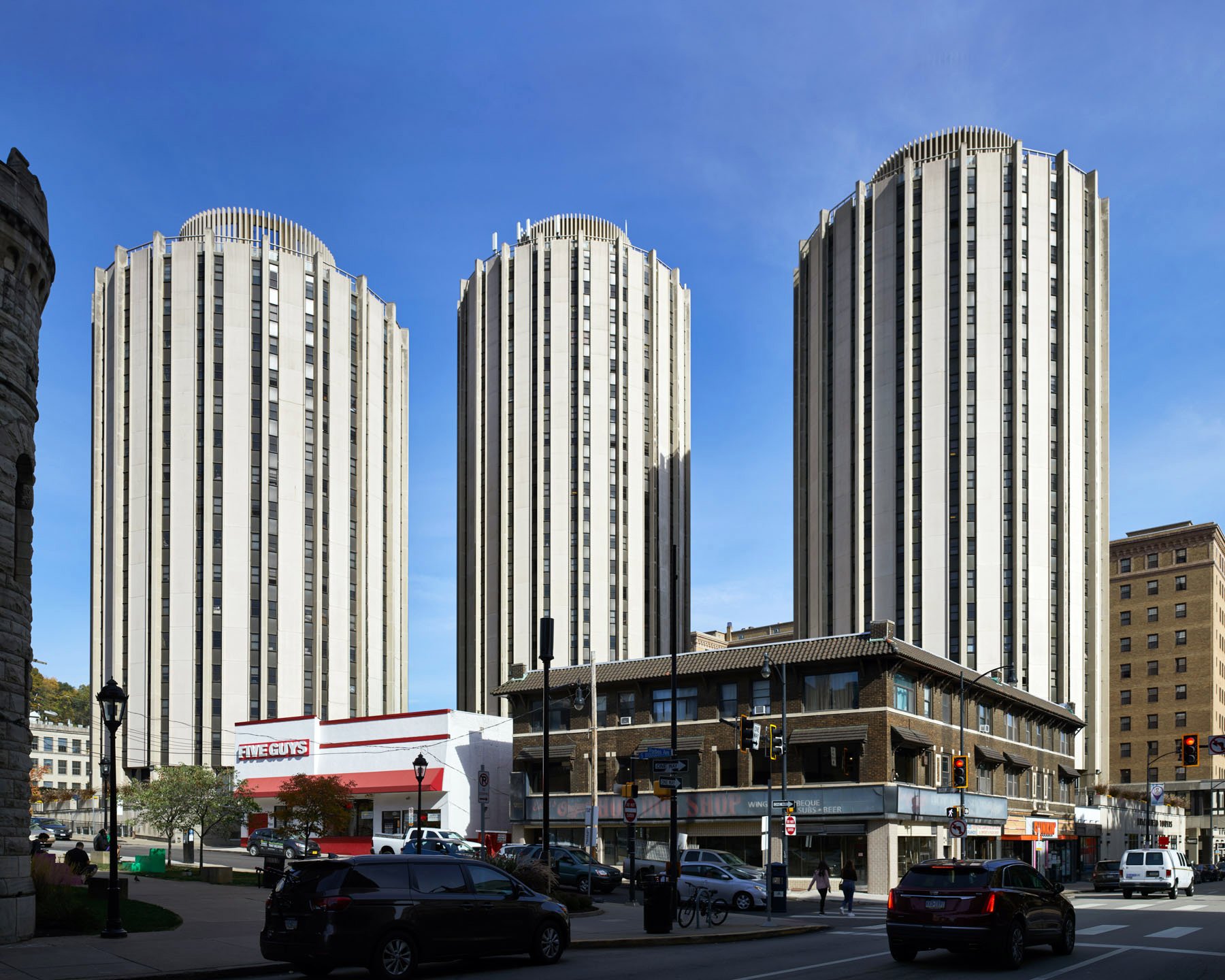
Deeter & Ritchey
Litchfield Towers
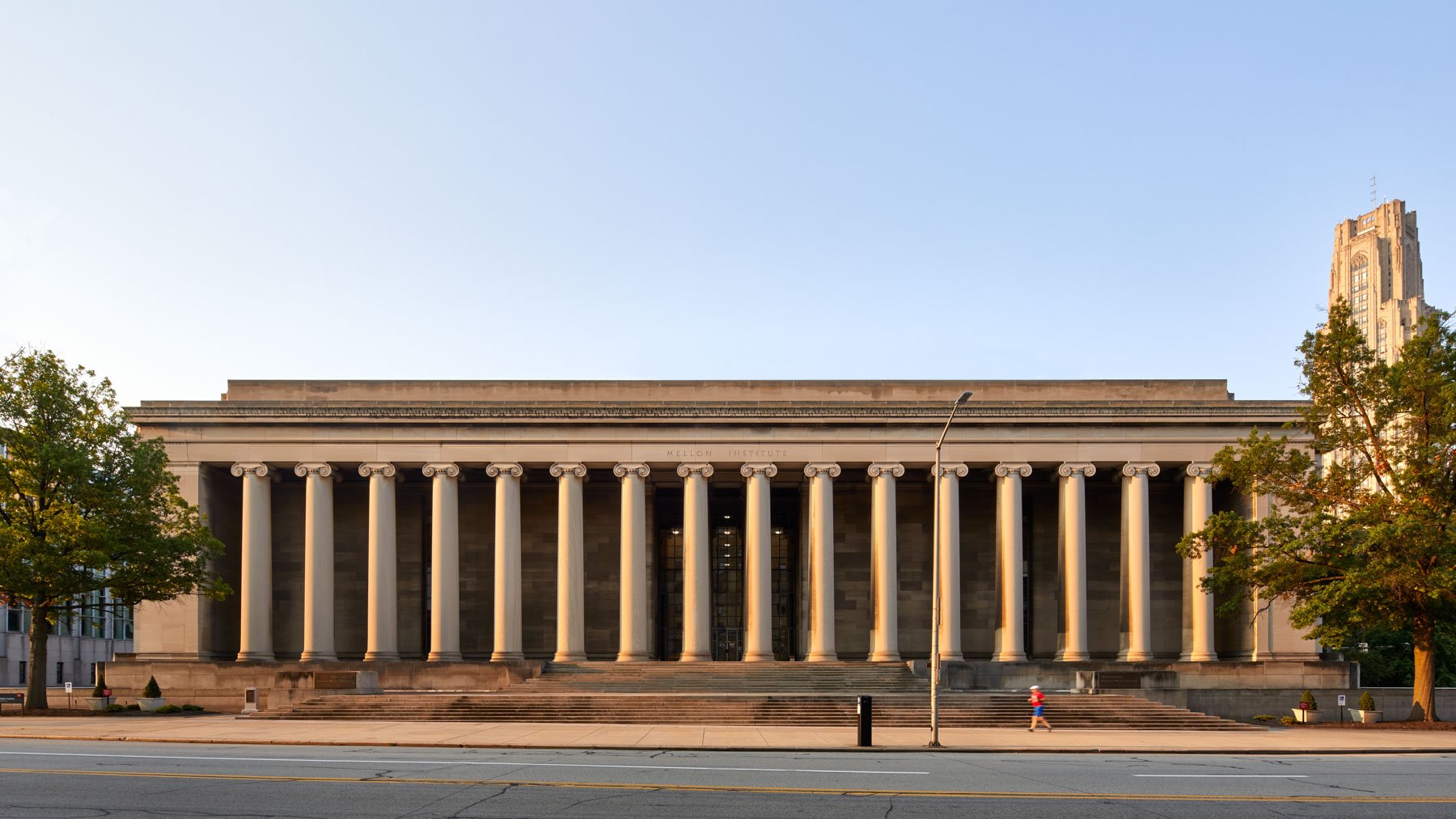
“Having matched the Parthenon, the Mellons then exceeded it in one spectacular gesture. At the Parthenon, the architect Ictinus, like all Greek and most Roman builders, could only construct columns by fitting together drums of marble. The Mellon Institute columns are not drums but single chunks of Indiana limestone.”
Benno Janssen
Mellon Institute
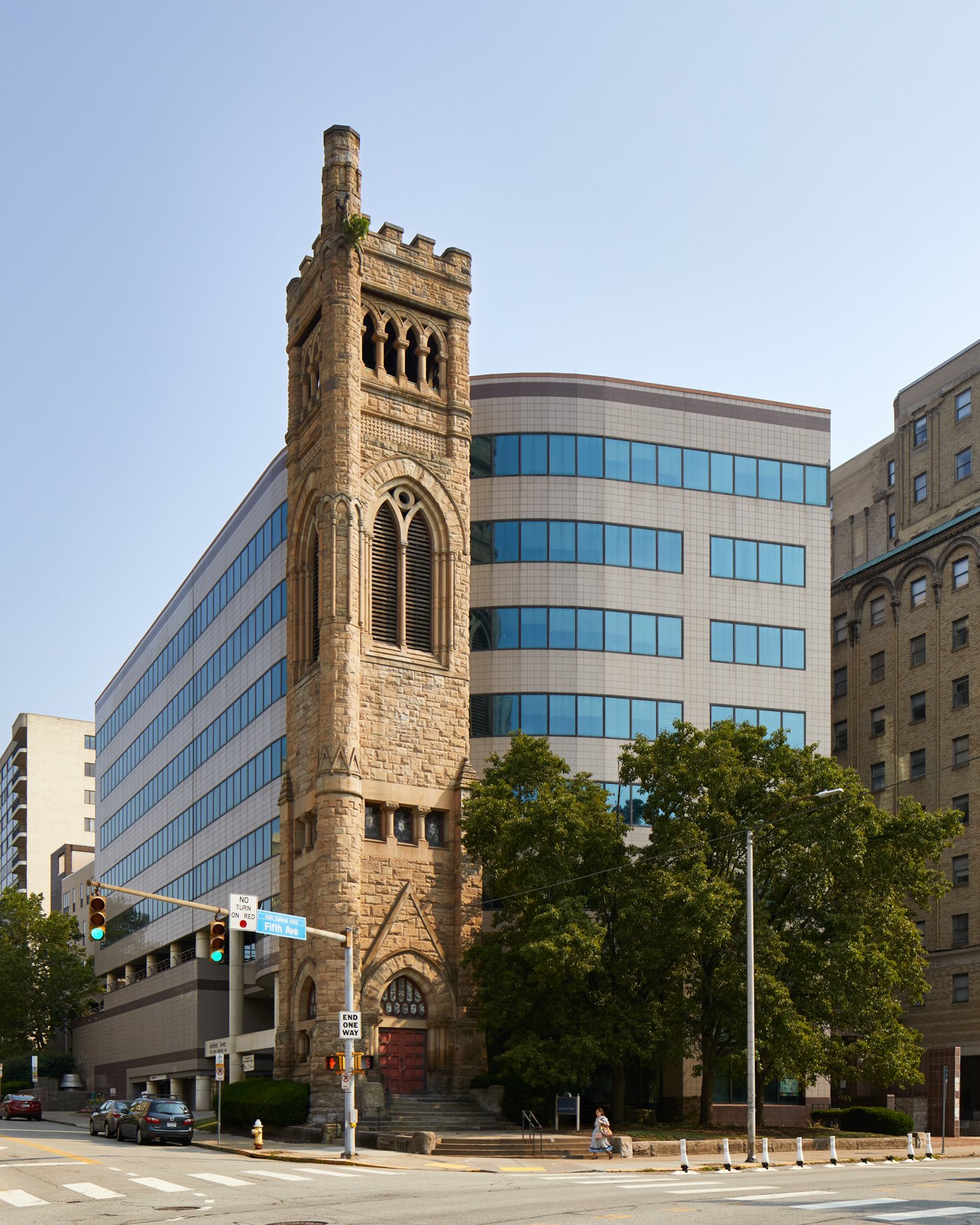
Bellefield Towers
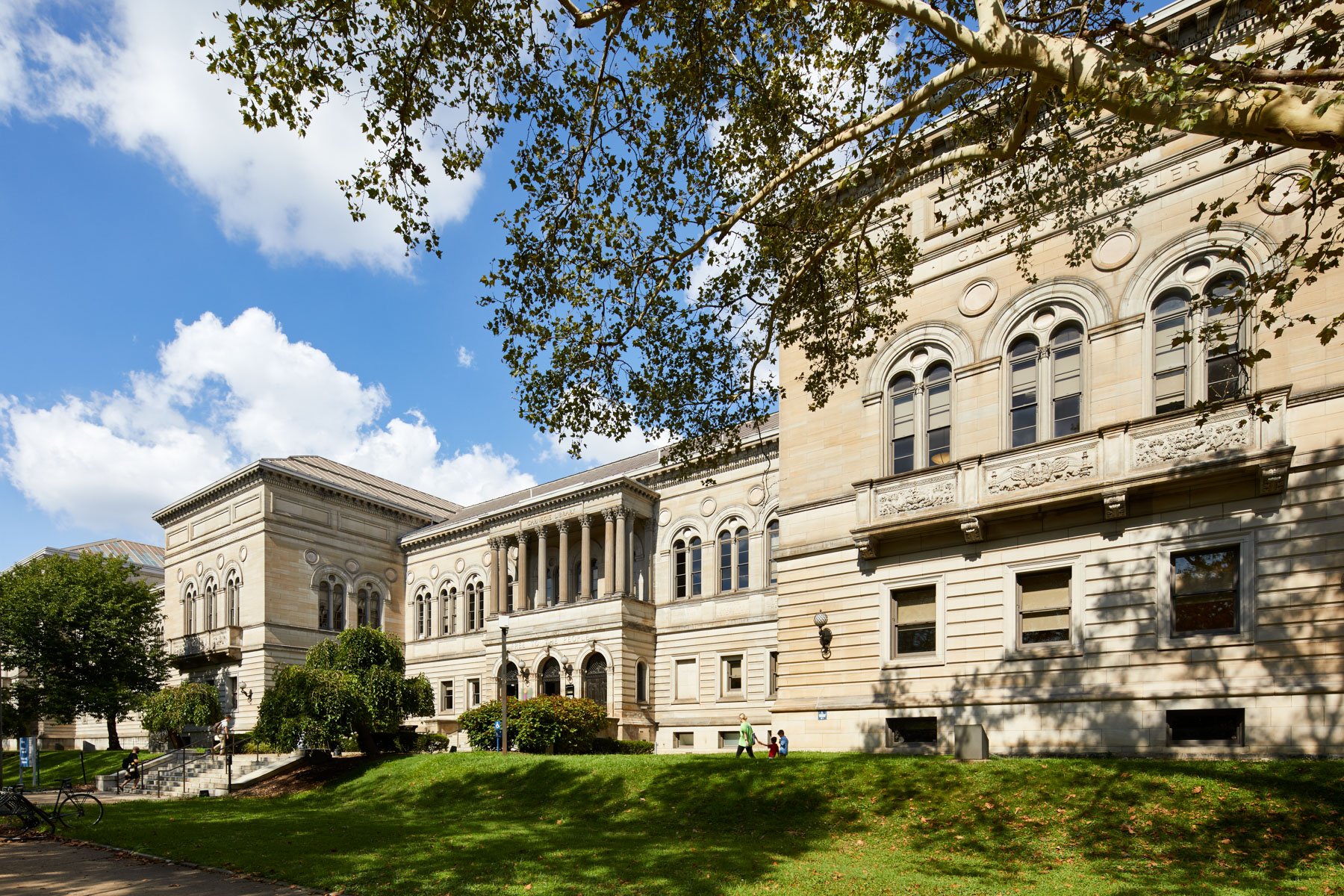
Longfellow, Alden & Harlow
Carnegie Library
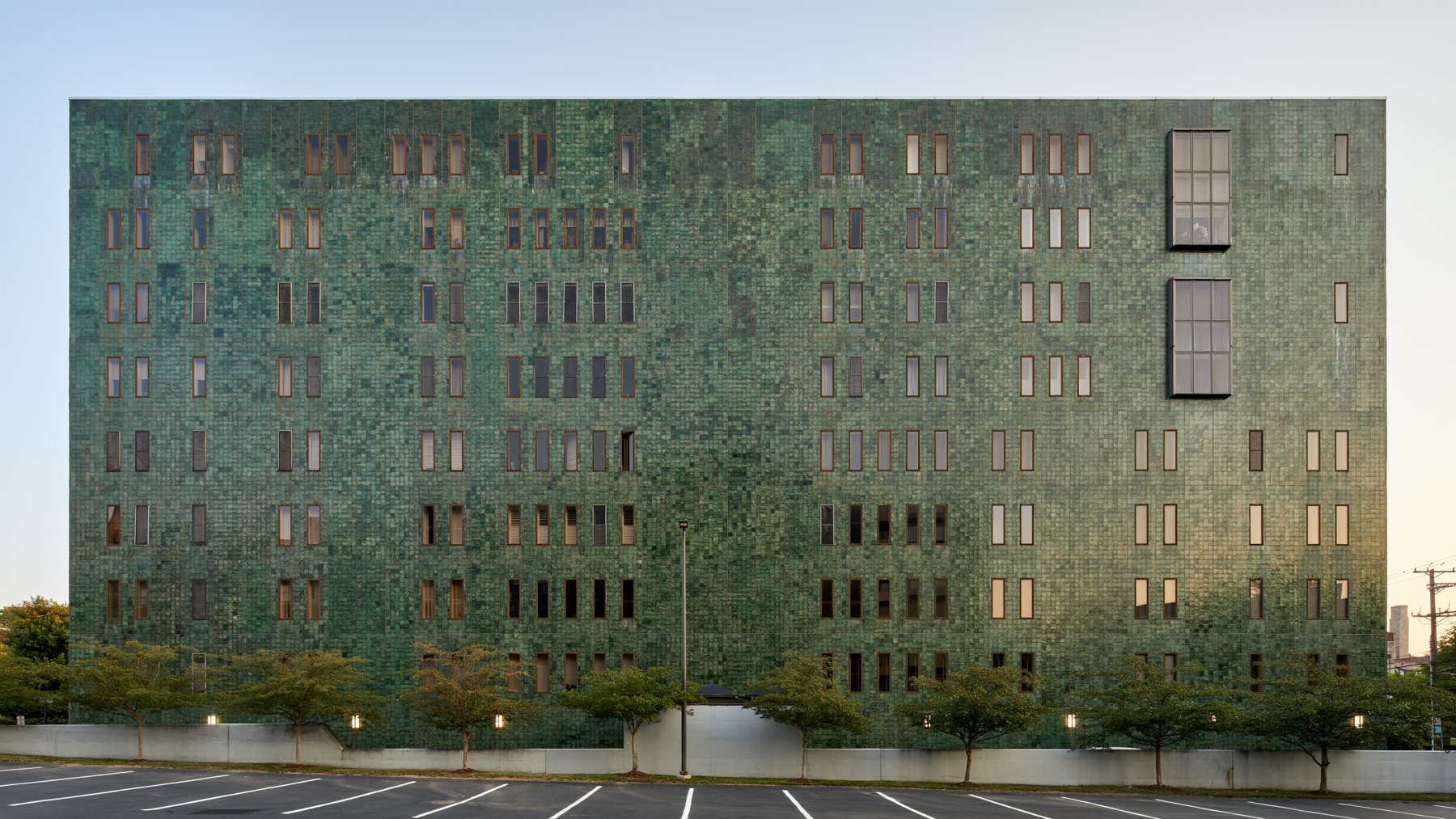
Herbert Seigle
Winchester Apartments

Belli & Belli Architects
Immaculate Conception Church

Boarman Kroos Vogel
Morrow Park Apartments

Henry Hornbostel
Congregation B'nai Israel

Frederick G. Scheibler Jr.
Old Heidelberg Apartments

Bohlin Cywinski Jackson
Frick Environmental Center
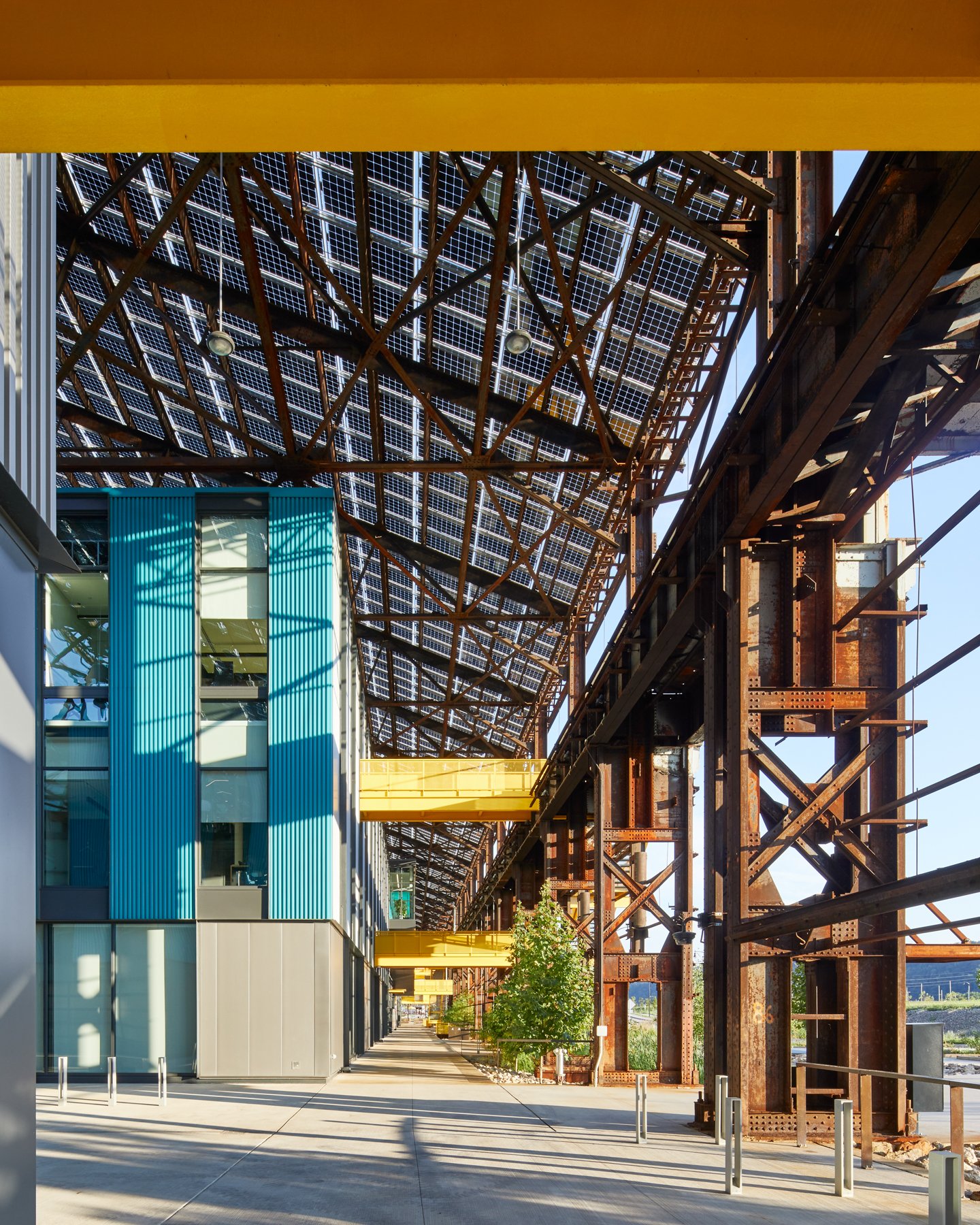
MSR Design
Mill 19
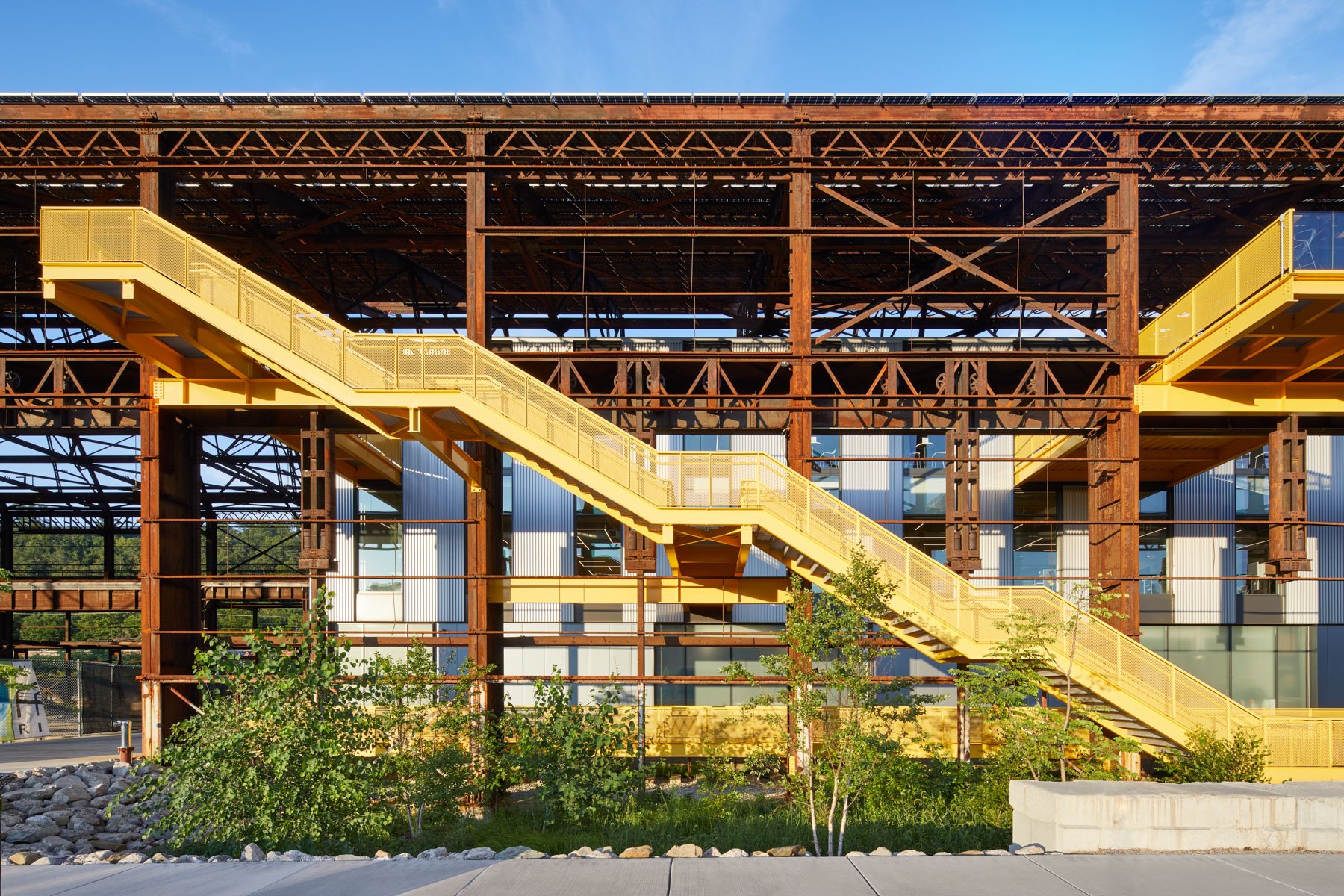
MSR Design
Mill 19
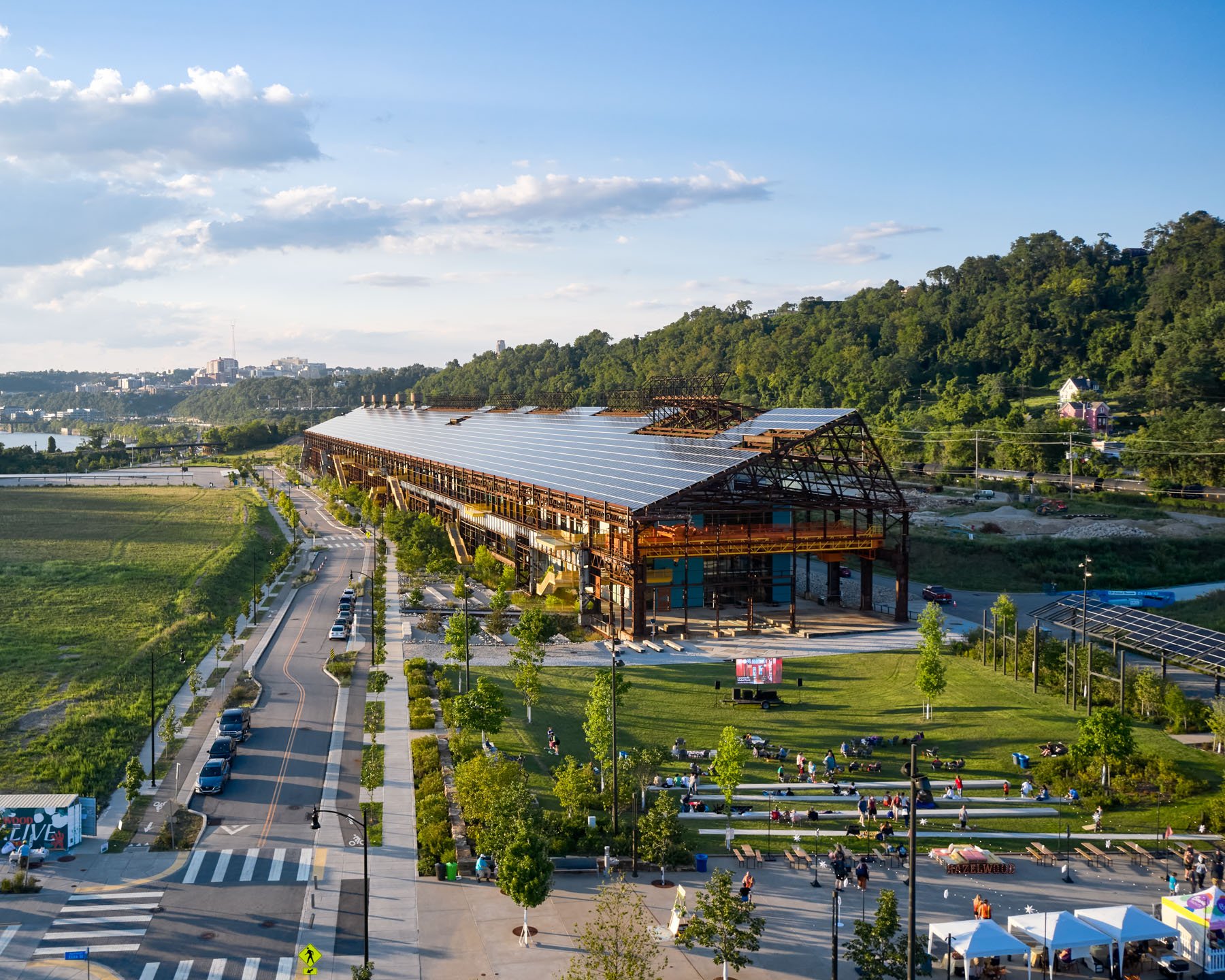
MSR Design
Mill 19
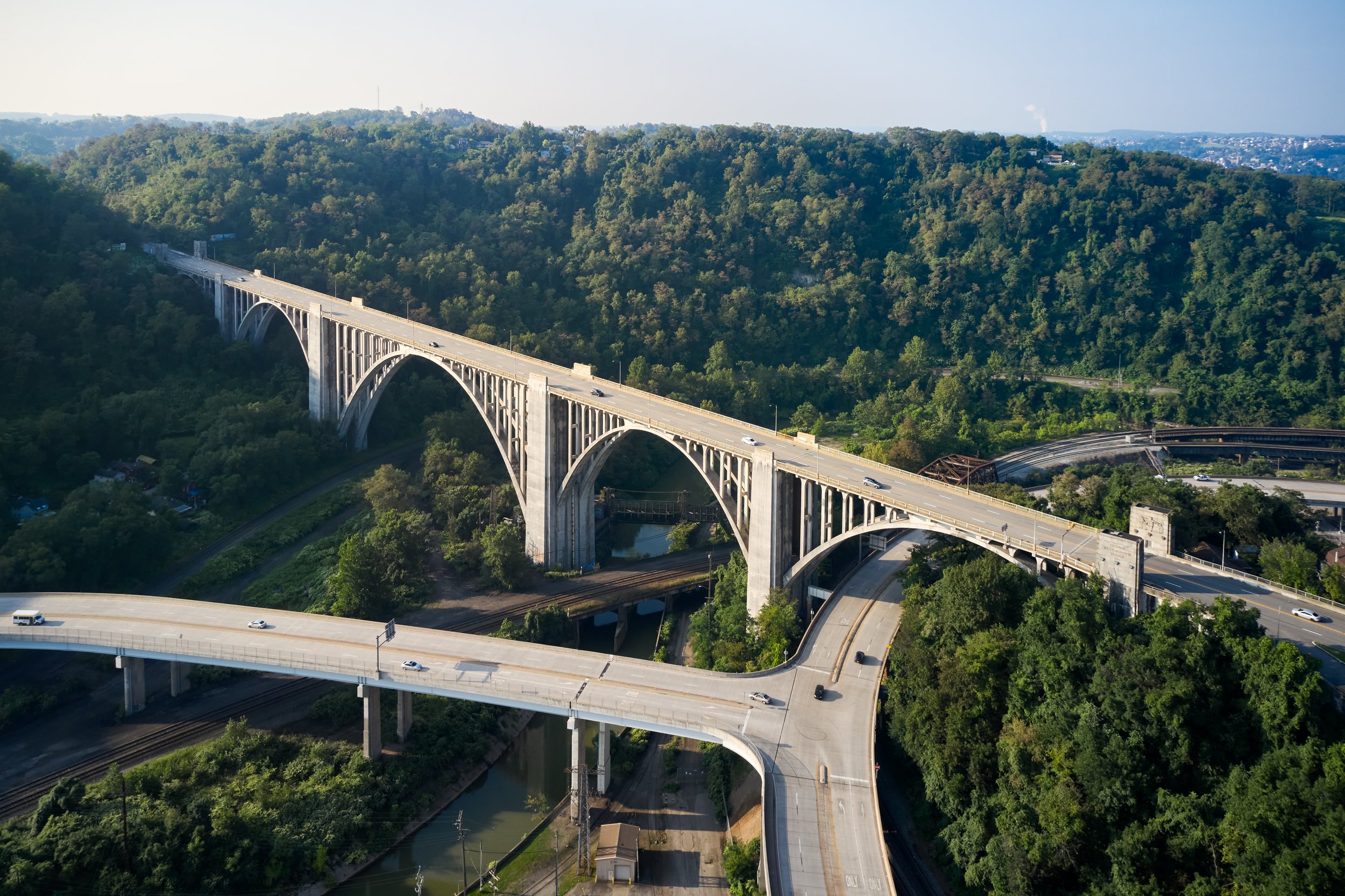
“Westinghouse stands as a paradigm of what a good bridge should be. Even after repeated viewings, one does not tire of the elegant proportions of the piers, the effortlessness of the semi-elliptical arches, Frank Vittor’s heroic Art Deco reliefs, and the perfect match of the natural wonder and inspired ingenuity of the site.”
George S. Richardson
George Westinghouse Bridge
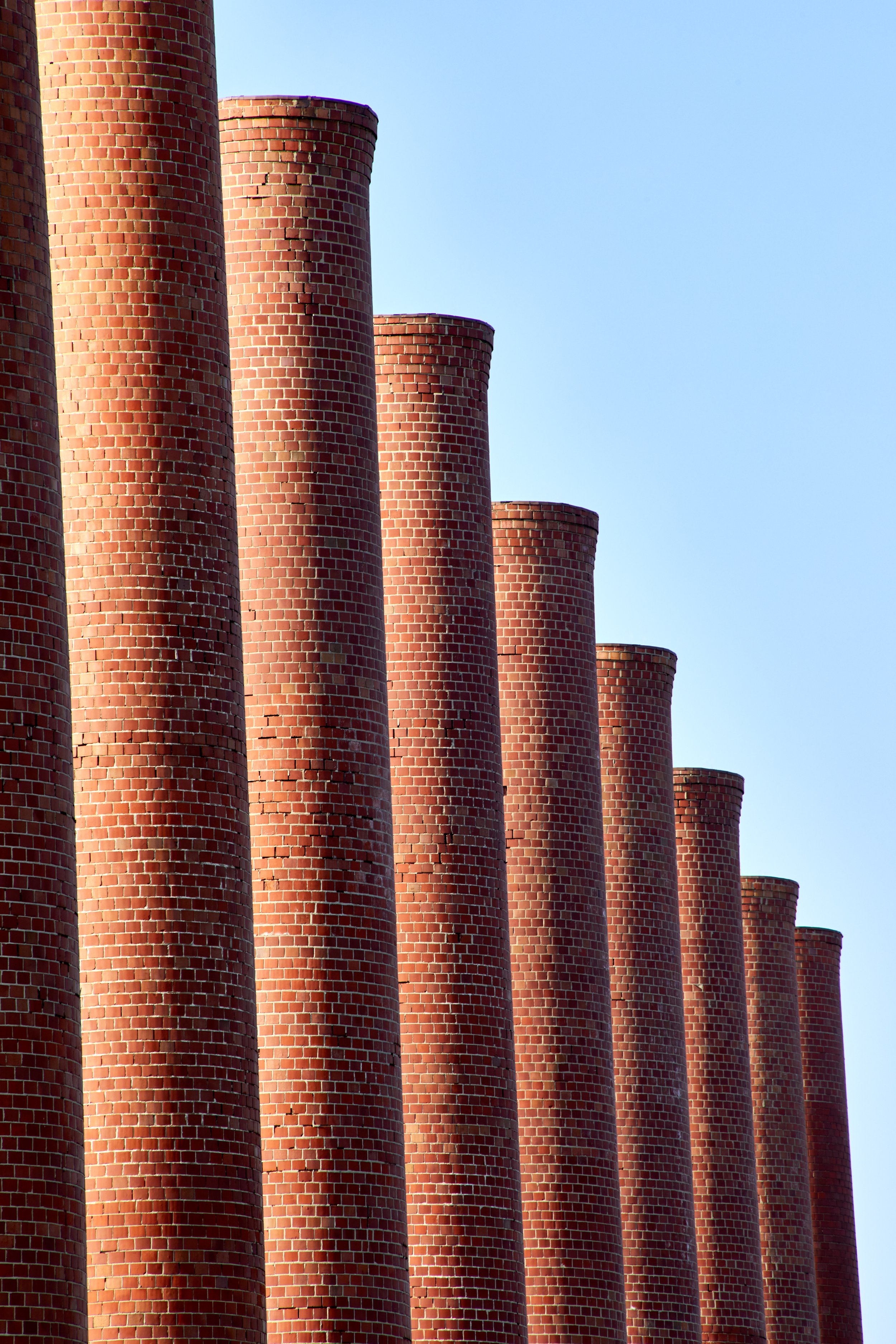
Homestead Stacks
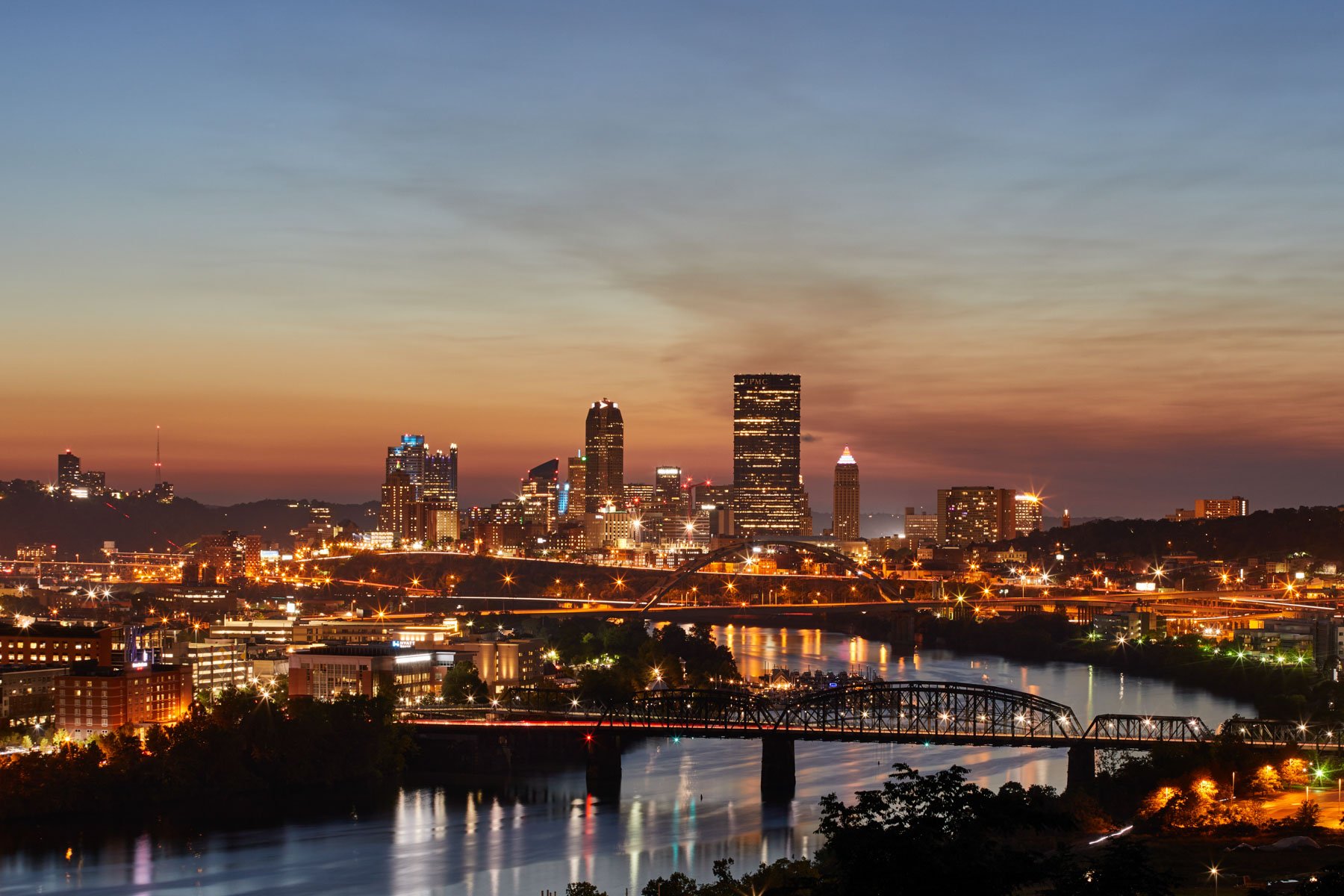
Skyline from Greenfield
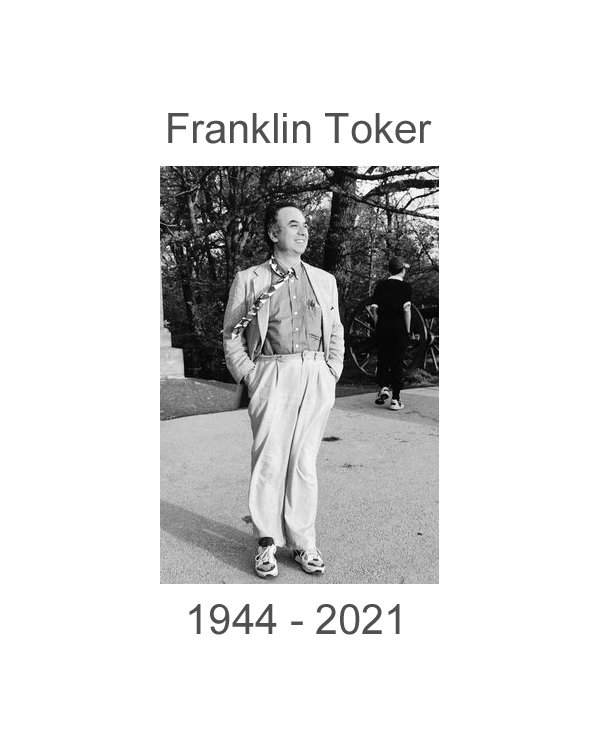





























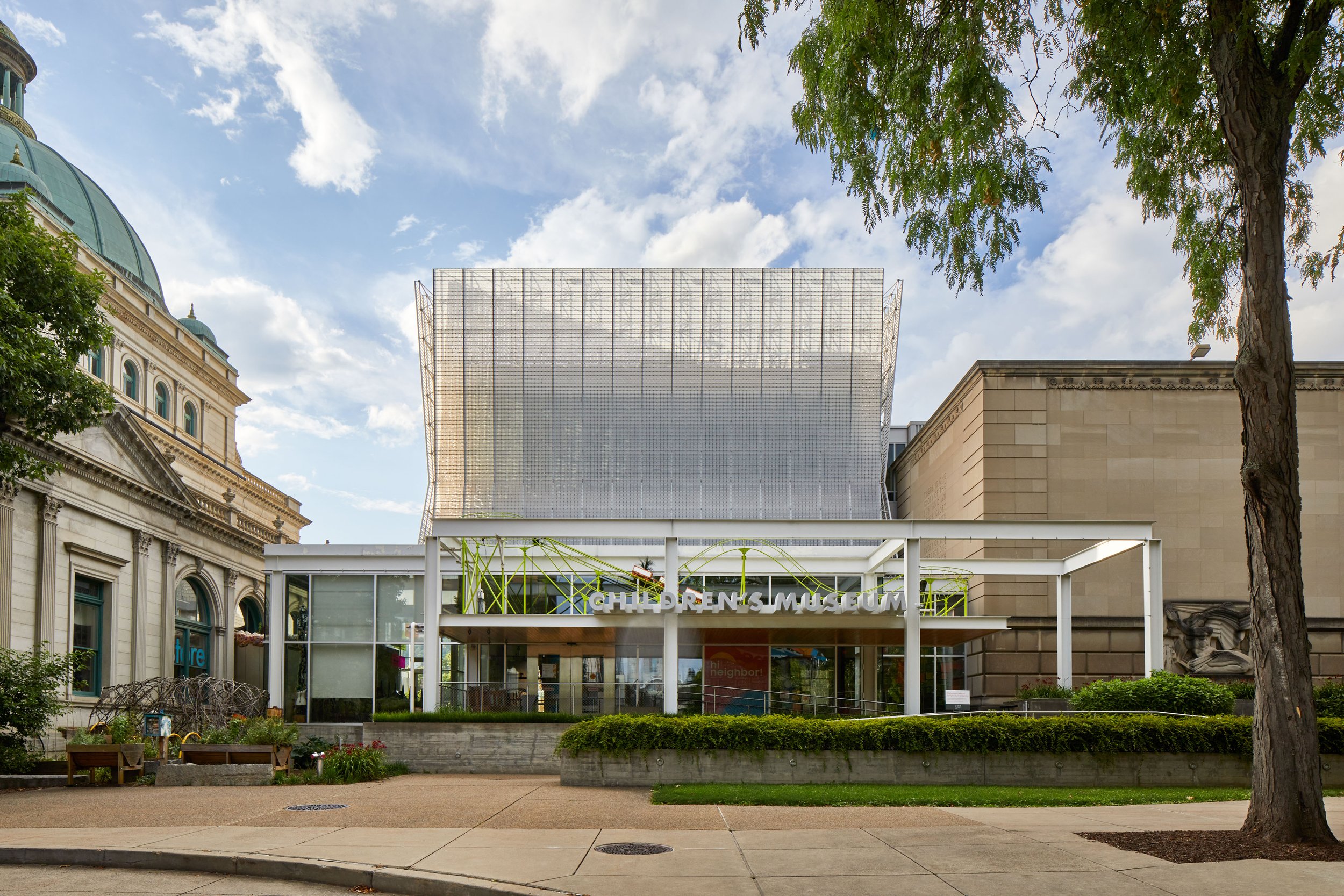


























Pittsburgh: After Toker
Before traveling to Pittsburgh, PA, I read Franklin Toker’s acclaimed architectural guide, Pittsburgh: An Urban Portrait. I was quickly drawn in by his knowledge of, and affinity for, the area. Inspired by Toker’s ability to place structures within the historical, cultural, and geographic context of the city, I used his guide to lead me on a photographic pursuit. His book took me through all eras and aspects of the city’s life, from the confluence of the three rivers to the surrounding hills and hollows, from icons of the Golden Triangle to lesser known neighborhood gems.
Additionally, considering that even the latest edition of the book is over a decade old, I took it upon myself to include what I thought were a few worthy new developments for the catalog.
R.I.P. Franklin Toker 1944 - 2021
All quotes by Franklin Toker
Skyline from Mt. Washington
Curtis & Davis
United Steelworkers Building
“From its birth in Chicago in the 1880s, the dogma of skyscraper construction was that the exterior walls supported nothing. This dogma held fast for three-quarters of a century until shattered by this Gateway building... U.S. Steel, as supplier and fabricator of the steel, and the design firm of Curtis & Davis of New Orleans knew that they were making structural history here, and they confidently publicized it during construction by painting the three different types of steel in the outside walls red, white, or blue to designate their different structural roles in the bearing wall.”
Curtis & Davis
United Steelworkers Building
Curtis & Davis
United Steelworkers Building
“It was a leap of faith in the future of Pittsburgh, and, in a way no longer imaginable, it was an electrifying demonstration of the healing power of modern architecture.”
Eggers & Higgins
Gateway Center
Eggers & Higgins
Gateway Center
Eggers & Higgins
Gateway Center
Left
Charles Bickel
Maginn Building
Right
Henry H. Richardson
Ewart Building
“The Union Trust makes a highly individual statement. It is clad in white terra-cotta plaques and carries an efflorescence of trefoil hoof molds projecting out as a cornice line. The roof line is lively without being busy, and it culminates in a forest of dormers, with two chapel-like elevator shafts poking out at top.”
Frederick J. Osterling
Union Trust Building
“The obvious precedent of the PPG design is the Victoria Tower at the House of Parliament in London, though it is only about half the height of PPG’s 635 feet.”
Johnson & Burgee
PPG Place
“When the company considered building a headquarters tower near its birthplace on Market Square, it knew that it would be relatively easy to buy only the half acre that it needed. But what PPG really wanted was to upgrade the whole district in the manner of Rockefeller Center, so it purchased an area ten times larger than needed for its own building.”
Johnson & Burgee
PPG Place
"There is a host of good architectural neighbors to the two congregations on Sixth Avenue. The open-air pulpit in front of First Presbyterian, an unusual medieval feature, points directly across the street at the most powerful of these, the Duquesne Club."
Longfellow, Alden & Harlow
Duquesne Club
Benno Janssen
Buhl Building
Gensler
Tower at PNC Plaza
Frederick C. Sauer
804 Penn Ave
"U.S. Steel is a building that commands respect for its engineering and sensitivity to urban design, bnut it is a hard building to love."
Harrison & Abramovitz
U.S. Steel Tower
"Cor-Ten, a steel invented in 1934, solved the corrosion problem, because its initial rust forms a protective coating around the steel."
Harrison & Abramovitz
U.S. Steel Tower
“Using aluminum wherever possible, Alcoa’s thirty story tower is radically lighter and more efficient than buildings of comparable size.”
Harrison & Abramovitz
Alcoa Building
“It’s curtain wall was not constructed piece by piece but prefabricated in aluminum sheets that contained both windows and the floor zone. The windows swing open in special rubber gaskets, so the building's exterior requires minimal cleaning and maintenance. Inside, the same spirit of radical innovation prevailed: aluminum furniture, aluminum piping and wiring, aluminum air-conditioning ducts, and an airy fanciful lobby. This list of distinctions briefly propelled Alcoa to top rank among post-war skyscrapers, but it was evidently too futuristic for the national design community, which shunned it for thirty years.”
Harrison & Abramovitz
Alcoa Building
Mitchell & Ritchey
Mellon Square
Private Residence
Smithfield-Liberty Garage
Ft. Duquesne and 6th St. Garage
“…this diminutive building from 1917 presents a glass facade of Gothic trefoils in the manner of Osterling’s Union Trust Building, Downtown. When it was Osterlings Studio it provided an elegant reception room above a large drafting hall below. Osterlings studio ranks among America’s earliest glass fronted buildings, and it speaks volumes about architects’ social and economic position in Pittsburgh society early in the twentieth century.”
Frederick J. Osterling
Frederick J. Osterling Studio
Frederick J. Osterling
Frederick J. Osterling Studio
Heinz Factory Complex
Meat & Cereal Buildings & Stacks
Albert Kahn
Heinz Factory Complex
Service & Auditorium Building
SOM
Heinz Factory Complex
Research Building
SOM
Heinz Factory Complex
Research Building
“The brickwork designs are richer than any Richardson had designed before, which shows his trust in the skilled Pittsburgh laborers who executed them.”
Henry H. Richardson
Emmanuel Episcopal Church
Henry H. Richardson
Emmanuel Episcopal Church
Skyline from the North Side
Allegheny Commons
Lake Elizabeth from above
Allegheny Commons
Gustav Lindenthal
Smithfield Street Bridge
Gustav Lindenthal
Smithfield Street Bridge
Charles Bickel
South Side Market Building
Charles Bickel
South Side Market Building
Mies van der Rohe
Mellon Hall
Deeter & Ritchey
Litchfield Towers
“Having matched the Parthenon, the Mellons then exceeded it in one spectacular gesture. At the Parthenon, the architect Ictinus, like all Greek and most Roman builders, could only construct columns by fitting together drums of marble. The Mellon Institute columns are not drums but single chunks of Indiana limestone.”
Benno Janssen
Mellon Institute
Bellefield Towers
Longfellow, Alden & Harlow
Carnegie Library
Herbert Seigle
Winchester Apartments
Belli & Belli Architects
Immaculate Conception Church
Boarman Kroos Vogel
Morrow Park Apartments
Henry Hornbostel
Congregation B'nai Israel
Frederick G. Scheibler Jr.
Old Heidelberg Apartments
Bohlin Cywinski Jackson
Frick Environmental Center
MSR Design
Mill 19
MSR Design
Mill 19
MSR Design
Mill 19
“Westinghouse stands as a paradigm of what a good bridge should be. Even after repeated viewings, one does not tire of the elegant proportions of the piers, the effortlessness of the semi-elliptical arches, Frank Vittor’s heroic Art Deco reliefs, and the perfect match of the natural wonder and inspired ingenuity of the site.”
George S. Richardson
George Westinghouse Bridge
Homestead Stacks
Skyline from Greenfield